A prolific data ransom gang that calls itself Scattered Lapsus ShinyHunters (SLSH) has a distinctive playbook when it seeks to extort payment from victim firms: Harassing, threatening and even swatting executives and their families, all while notifying journalists and regulators about the extent of the intrusion. Some victims reportedly are paying — perhaps as much to contain the stolen data as to stop the escalating personal attacks. But a top SLSH expert warns that engaging at all beyond a “We’re not paying” response only encourages further harassment, noting that the group’s fractious and unreliable history means the only winning move is not to pay.

Image: Shutterstock.com, @Mungujakisa
Unlike traditional, highly regimented Russia-based ransomware affiliate groups, SLSH is an unruly and somewhat fluid English-language extortion gang that appears uninterested in building a reputation of consistent behavior whereby victims might have some measure of confidence that the criminals will keep their word if paid.
That’s according to Allison Nixon, director of research at the New York City based security consultancy Unit 221B. Nixon has been closely tracking the criminal group and individual members as they bounce between various Telegram channels used to extort and harass victims, and she said SLSH differs from traditional data ransom groups in other important ways that argue against trusting them to do anything they say they’ll do — such as destroying stolen data.
Like SLSH, many traditional Russian ransomware groups have employed high-pressure tactics to force payment in exchange for a decryption key and/or a promise to delete stolen data, such as publishing a dark web shaming blog with samples of stolen data next to a countdown clock, or notifying journalists and board members of the victim company. But Nixon said the extortion from SLSH quickly escalates way beyond that — to threats of physical violence against executives and their families, DDoS attacks on the victim’s website, and repeated email-flooding campaigns.
SLSH is known for breaking into companies by phishing employees over the phone, and using the purloined access to steal sensitive internal data. In a January 30 blog post, Google’s security forensics firm Mandiant said SLSH’s most recent extortion attacks stem from incidents spanning early to mid-January 2026, when SLSH members pretended to be IT staff and called employees at targeted victim organizations claiming that the company was updating MFA settings.
“The threat actor directed the employees to victim-branded credential harvesting sites to capture their SSO credentials and MFA codes, and then registered their own device for MFA,” the blog post explained.
Victims often first learn of the breach when their brand name is uttered on whatever ephemeral new public Telegram group chat SLSH is using to threaten, extort and harass their prey. According to Nixon, the coordinated harassment on the SLSH Telegram channels is part of a well-orchestrated strategy to overwhelm the victim organization by manufacturing humiliation that pushes them over the threshold to pay.
Nixon said multiple executives at targeted organizations have been subject to “swatting” attacks, wherein SLSH communicated a phony bomb threat or hostage situation at the target’s address in the hopes of eliciting a heavily armed police response at their home or place of work.
“A big part of what they’re doing to victims is the psychological aspect of it, like harassing executives’ kids and threatening the board of the company,” Nixon told KrebsOnSecurity. “And while these victims are getting extortion demands, they’re simultaneously getting outreach from media outlets saying, ‘Hey, do you have any comments on the bad things we’re going to write about you.”
In a blog post today, Unit 221B argues that no one should negotiate with SLSH because the group has demonstrated a willingness to extort victims based on promises that it has no intention to keep. Nixon points out that all of SLSH’s known members hail from The Com, shorthand for a constellation of cybercrime-focused Discord and Telegram communities which serve as a kind of distributed social network that facilitates instant collaboration.
Nixon said Com-based extortion groups tend to instigate feuds and drama between group members, leading to lying, betrayals, credibility destroying behavior, backstabbing, and sabotaging each other.
“With this type of ongoing dysfunction, often compounding by substance abuse, these threat actors often aren’t able to act with the core goal in mind of completing a successful, strategic ransom operation,” Nixon wrote. “They continually lose control with outbursts that put their strategy and operational security at risk, which severely limits their ability to build a professional, scalable, and sophisticated criminal organization network for continued successful ransoms – unlike other, more tenured and professional criminal organizations focused on ransomware alone.”
Intrusions from established ransomware groups typically center around encryption/decryption malware that mostly stays on the affected machine. In contrast, Nixon said, ransom from a Com group is often structured the same as violent sextortion schemes against minors, wherein members of The Com will steal damaging information, threaten to release it, and “promise” to delete it if the victim complies without any guarantee or technical proof point that they will keep their word. She writes:
A key component of SLSH’s efforts to convince victims to pay, Nixon said, involves manipulating the media into hyping the threat posed by this group. This approach also borrows a page from the playbook of sextortion attacks, she said, which encourages predators to keep targets continuously engaged and worrying about the consequences of non-compliance.
“On days where SLSH had no substantial criminal ‘win’ to announce, they focused on announcing death threats and harassment to keep law enforcement, journalists, and cybercrime industry professionals focused on this group,” she said.
Nixon knows a thing or two about being threatened by SLSH: For the past several months, the group’s Telegram channels have been replete with threats of physical violence against her, against Yours Truly, and against other security researchers. These threats, she said, are just another way the group seeks to generate media attention and achieve a veneer of credibility, but they are useful as indicators of compromise because SLSH members tend to name drop and malign security researchers even in their communications with victims.
“Watch for the following behaviors in their communications to you or their public statements,” Unit 221B’s advisory reads. “Repeated abusive mentions of Allison Nixon (or “A.N”), Unit 221B, or cybersecurity journalists—especially Brian Krebs—or any other cybersecurity employee, or cybersecurity company. Any threats to kill, or commit terrorism, or violence against internal employees, cybersecurity employees, investigators, and journalists.”
Unit 221B says that while the pressure campaign during an extortion attempt may be traumatizing to employees, executives, and their family members, entering into drawn-out negotiations with SLSH incentivizes the group to increase the level of harm and risk, which could include the physical safety of employees and their families.
“The breached data will never go back to the way it was, but we can assure you that the harassment will end,” Nixon said. “So, your decision to pay should be a separate issue from the harassment. We believe that when you separate these issues, you will objectively see that the best course of action to protect your interests, in both the short and long term, is to refuse payment.”
A prolific cybercriminal group that calls itself “Scattered LAPSUS$ Hunters” has dominated headlines this year by regularly stealing data from and publicly mass extorting dozens of major corporations. But the tables seem to have turned somewhat for “Rey,” the moniker chosen by the technical operator and public face of the hacker group: Earlier this week, Rey confirmed his real life identity and agreed to an interview after KrebsOnSecurity tracked him down and contacted his father.
Scattered LAPSUS$ Hunters (SLSH) is thought to be an amalgamation of three hacking groups — Scattered Spider, LAPSUS$ and ShinyHunters. Members of these gangs hail from many of the same chat channels on the Com, a mostly English-language cybercriminal community that operates across an ocean of Telegram and Discord servers.
In May 2025, SLSH members launched a social engineering campaign that used voice phishing to trick targets into connecting a malicious app to their organization’s Salesforce portal. The group later launched a data leak portal that threatened to publish the internal data of three dozen companies that allegedly had Salesforce data stolen, including Toyota, FedEx, Disney/Hulu, and UPS.

The new extortion website tied to ShinyHunters, which threatens to publish stolen data unless Salesforce or individual victim companies agree to pay a ransom.
Last week, the SLSH Telegram channel featured an offer to recruit and reward “insiders,” employees at large companies who agree to share internal access to their employer’s network for a share of whatever ransom payment is ultimately paid by the victim company.
SLSH has solicited insider access previously, but their latest call for disgruntled employees started making the rounds on social media at the same time news broke that the cybersecurity firm Crowdstrike had fired an employee for allegedly sharing screenshots of internal systems with the hacker group (Crowdstrike said their systems were never compromised and that it has turned the matter over to law enforcement agencies).
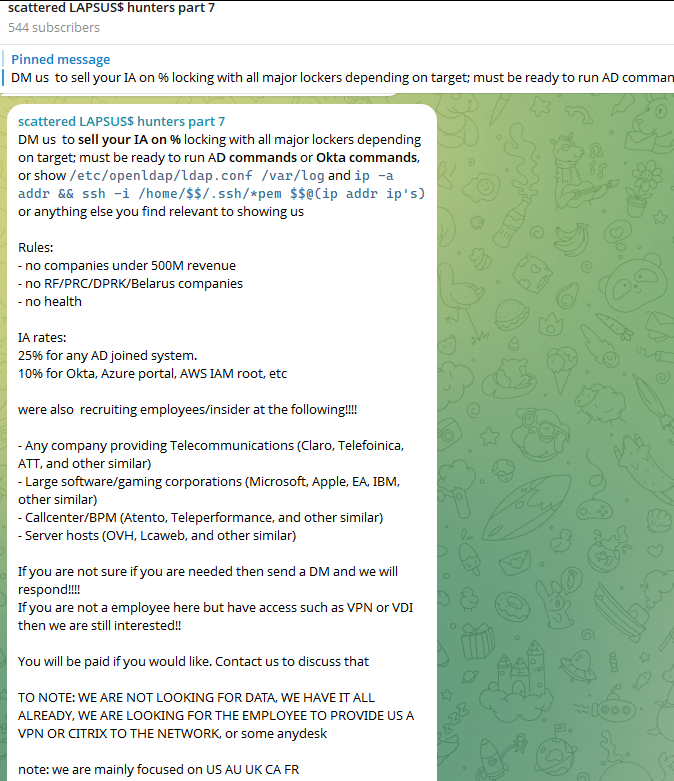
The Telegram server for the Scattered LAPSUS$ Hunters has been attempting to recruit insiders at large companies.
Members of SLSH have traditionally used other ransomware gangs’ encryptors in attacks, including malware from ransomware affiliate programs like ALPHV/BlackCat, Qilin, RansomHub, and DragonForce. But last week, SLSH announced on its Telegram channel the release of their own ransomware-as-a-service operation called ShinySp1d3r.
The individual responsible for releasing the ShinySp1d3r ransomware offering is a core SLSH member who goes by the handle “Rey” and who is currently one of just three administrators of the SLSH Telegram channel. Previously, Rey was an administrator of the data leak website for Hellcat, a ransomware group that surfaced in late 2024 and was involved in attacks on companies including Schneider Electric, Telefonica, and Orange Romania.
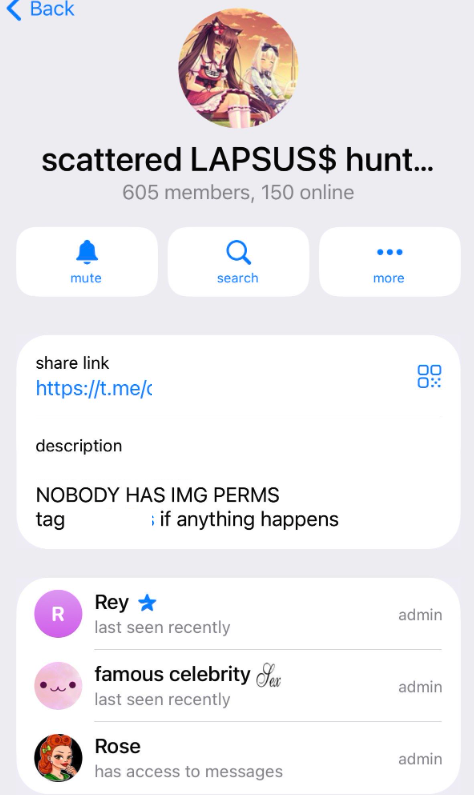
A recent, slightly redacted screenshot of the Scattered LAPSUS$ Hunters Telegram channel description, showing Rey as one of three administrators.
Also in 2024, Rey would take over as administrator of the most recent incarnation of BreachForums, an English-language cybercrime forum whose domain names have been seized on multiple occasions by the FBI and/or by international authorities. In April 2025, Rey posted on Twitter/X about another FBI seizure of BreachForums.
On October 5, 2025, the FBI announced it had once again seized the domains associated with BreachForums, which it described as a major criminal marketplace used by ShinyHunters and others to traffic in stolen data and facilitate extortion.
“This takedown removes access to a key hub used by these actors to monetize intrusions, recruit collaborators, and target victims across multiple sectors,” the FBI said.
Incredibly, Rey would make a series of critical operational security mistakes last year that provided multiple avenues to ascertain and confirm his real-life identity and location. Read on to learn how it all unraveled for Rey.
According to the cyber intelligence firm Intel 471, Rey was an active user on various BreachForums reincarnations over the past two years, authoring more than 200 posts between February 2024 and July 2025. Intel 471 says Rey previously used the handle “Hikki-Chan” on BreachForums, where their first post shared data allegedly stolen from the U.S. Centers for Disease Control and Prevention (CDC).
In that February 2024 post about the CDC, Hikki-Chan says they could be reached at the Telegram username @wristmug. In May 2024, @wristmug posted in a Telegram group chat called “Pantifan” a copy of an extortion email they said they received that included their email address and password.
The message that @wristmug cut and pasted appears to have been part of an automated email scam that claims it was sent by a hacker who has compromised your computer and used your webcam to record a video of you while you were watching porn. These missives threaten to release the video to all your contacts unless you pay a Bitcoin ransom, and they typically reference a real password the recipient has used previously.
“Noooooo,” the @wristmug account wrote in mock horror after posting a screenshot of the scam message. “I must be done guys.”
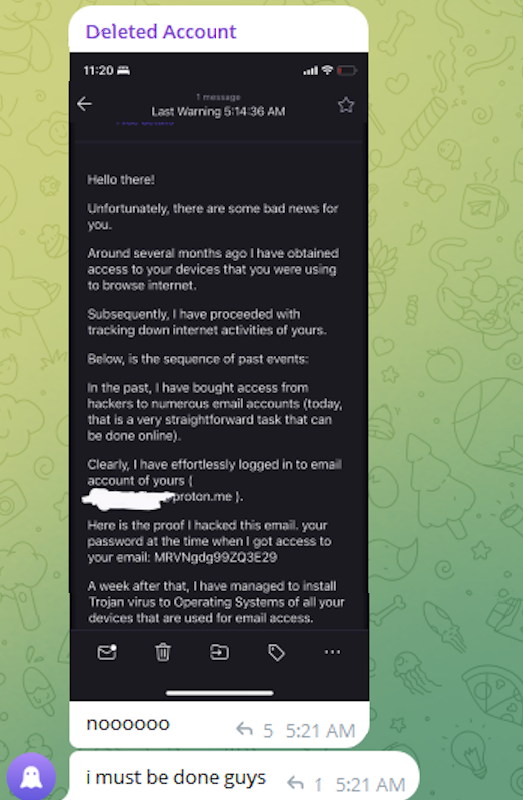
A message posted to Telegram by Rey/@wristmug.
In posting their screenshot, @wristmug redacted the username portion of the email address referenced in the body of the scam message. However, they did not redact their previously-used password, and they left the domain portion of their email address (@proton.me) visible in the screenshot.
Searching on @wristmug’s rather unique 15-character password in the breach tracking service Spycloud finds it is known to have been used by just one email address: cybero5tdev@proton.me. According to Spycloud, those credentials were exposed at least twice in early 2024 when this user’s device was infected with an infostealer trojan that siphoned all of its stored usernames, passwords and authentication cookies (a finding that was initially revealed in March 2025 by the cyber intelligence firm KELA).
Intel 471 shows the email address cybero5tdev@proton.me belonged to a BreachForums member who went by the username o5tdev. Searching on this nickname in Google brings up at least two website defacement archives showing that a user named o5tdev was previously involved in defacing sites with pro-Palestinian messages. The screenshot below, for example, shows that 05tdev was part of a group called Cyb3r Drag0nz Team.

Rey/o5tdev’s defacement pages. Image: archive.org.
A 2023 report from SentinelOne described Cyb3r Drag0nz Team as a hacktivist group with a history of launching DDoS attacks and cyber defacements as well as engaging in data leak activity.
“Cyb3r Drag0nz Team claims to have leaked data on over a million of Israeli citizens spread across multiple leaks,” SentinelOne reported. “To date, the group has released multiple .RAR archives of purported personal information on citizens across Israel.”
The cyber intelligence firm Flashpoint finds the Telegram user @05tdev was active in 2023 and early 2024, posting in Arabic on anti-Israel channels like “Ghost of Palestine” [full disclosure: Flashpoint is currently an advertiser on this blog].
Flashpoint shows that Rey’s Telegram account (ID7047194296) was particularly active in a cybercrime-focused channel called Jacuzzi, where this user shared several personal details, including that their father was an airline pilot. Rey claimed in 2024 to be 15 years old, and to have family connections to Ireland.
Specifically, Rey mentioned in several Telegram chats that he had Irish heritage, even posting a graphic that shows the prevalence of the surname “Ginty.”

Rey, on Telegram claiming to have association to the surname “Ginty.” Image: Flashpoint.
Spycloud indexed hundreds of credentials stolen from cybero5dev@proton.me, and those details indicate that Rey’s computer is a shared Microsoft Windows device located in Amman, Jordan. The credential data stolen from Rey in early 2024 show there are multiple users of the infected PC, but that all shared the same last name of Khader and an address in Amman, Jordan.
The “autofill” data lifted from Rey’s family PC contains an entry for a 46-year-old Zaid Khader that says his mother’s maiden name was Ginty. The infostealer data also shows Zaid Khader frequently accessed internal websites for employees of Royal Jordanian Airlines.
The infostealer data makes clear that Rey’s full name is Saif Al-Din Khader. Having no luck contacting Saif directly, KrebsOnSecurity sent an email to his father Zaid. The message invited the father to respond via email, phone or Signal, explaining that his son appeared to be deeply enmeshed in a serious cybercrime conspiracy.
Less than two hours later, I received a Signal message from Saif, who said his dad suspected the email was a scam and had forwarded it to him.
“I saw your email, unfortunately I don’t think my dad would respond to this because they think its some ‘scam email,'” said Saif, who told me he turns 16 years old next month. “So I decided to talk to you directly.”
Saif explained that he’d already heard from European law enforcement officials, and had been trying to extricate himself from SLSH. When asked why then he was involved in releasing SLSH’s new ShinySp1d3r ransomware-as-a-service offering, Saif said he couldn’t just suddenly quit the group.
“Well I cant just dip like that, I’m trying to clean up everything I’m associated with and move on,” he said.

The former Hellcat ransomware site. Image: Kelacyber.com
He also shared that ShinySp1d3r is just a rehash of Hellcat ransomware, except modified with AI tools. “I gave the source code of Hellcat ransomware out basically.”
Saif claims he reached out on his own recently to the Telegram account for Operation Endgame, the codename for an ongoing law enforcement operation targeting cybercrime services, vendors and their customers.
“I’m already cooperating with law enforcement,” Saif said. “In fact, I have been talking to them since at least June. I have told them nearly everything. I haven’t really done anything like breaching into a corp or extortion related since September.”
Saif suggested that a story about him right now could endanger any further cooperation he may be able to provide. He also said he wasn’t sure if the U.S. or European authorities had been in contact with the Jordanian government about his involvement with the hacking group.
“A story would bring so much unwanted heat and would make things very difficult if I’m going to cooperate,” Saif said. “I’m unsure whats going to happen they said they’re in contact with multiple countries regarding my request but its been like an entire week and I got no updates from them.”
Saif shared a screenshot that indicated he’d contacted Europol authorities late last month. But he couldn’t name any law enforcement officials he said were responding to his inquiries, and KrebsOnSecurity was unable to verify his claims.
“I don’t really care I just want to move on from all this stuff even if its going to be prison time or whatever they gonna say,” Saif said.
A cybercriminal group that used voice phishing attacks to siphon more than a billion records from Salesforce customers earlier this year has launched a website that threatens to publish data stolen from dozens of Fortune 500 firms if they refuse to pay a ransom. The group also claimed responsibility for a recent breach involving Discord user data, and for stealing terabytes of sensitive files from thousands of customers of the enterprise software maker Red Hat.

The new extortion website tied to ShinyHunters (UNC6040), which threatens to publish stolen data unless Salesforce or individual victim companies agree to pay a ransom.
In May 2025, a prolific and amorphous English-speaking cybercrime group known as ShinyHunters launched a social engineering campaign that used voice phishing to trick targets into connecting a malicious app to their organization’s Salesforce portal.
The first real details about the incident came in early June, when the Google Threat Intelligence Group (GTIG) warned that ShinyHunters — tracked by Google as UNC6040 — was extorting victims over their stolen Salesforce data, and that the group was poised to launch a data leak site to publicly shame victim companies into paying a ransom to keep their records private. A month later, Google acknowledged that one of its own corporate Salesforce instances was impacted in the voice phishing campaign.
Last week, a new victim shaming blog dubbed “Scattered LAPSUS$ Hunters” began publishing the names of companies that had customer Salesforce data stolen as a result of the May voice phishing campaign.
“Contact us to negotiate this ransom or all your customers data will be leaked,” the website stated in a message to Salesforce. “If we come to a resolution all individual extortions against your customers will be withdrawn from. Nobody else will have to pay us, if you pay, Salesforce, Inc.”
Below that message were more than three dozen entries for companies that allegedly had Salesforce data stolen, including Toyota, FedEx, Disney/Hulu, and UPS. The entries for each company specified the volume of stolen data available, as well as the date that the information was retrieved (the stated breach dates range between May and September 2025).
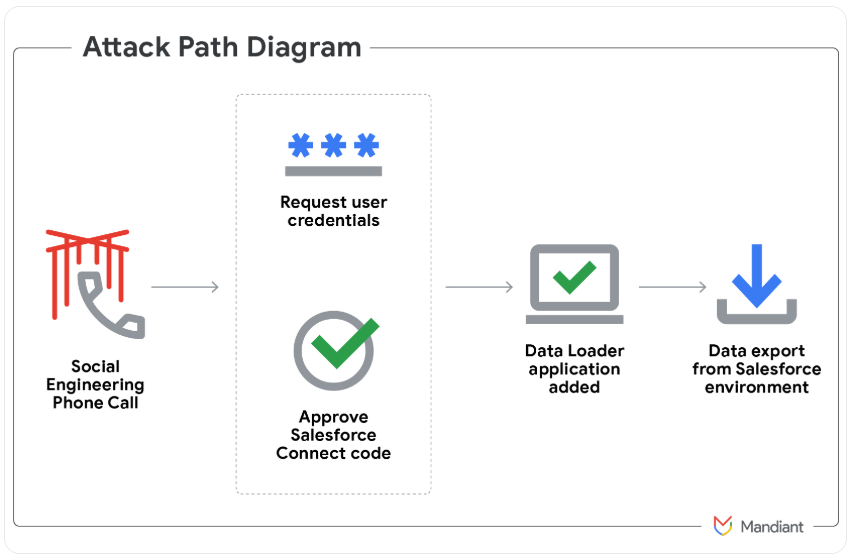
Image: Mandiant.
On October 5, the Scattered LAPSUS$ Hunters victim shaming and extortion blog announced that the group was responsible for a breach in September involving a GitLab server used by Red Hat that contained more than 28,000 Git code repositories, including more than 5,000 Customer Engagement Reports (CERs).
“Alot of folders have their client’s secrets such as artifactory access tokens, git tokens, azure, docker (redhat docker, azure containers, dockerhub), their client’s infrastructure details in the CERs like the audits that were done for them, and a whole LOT more, etc.,” the hackers claimed.
Their claims came several days after a previously unknown hacker group calling itself the Crimson Collective took credit for the Red Hat intrusion on Telegram.
Red Hat disclosed on October 2 that attackers had compromised a company GitLab server, and said it was in the process of notifying affected customers.
“The compromised GitLab instance housed consulting engagement data, which may include, for example, Red Hat’s project specifications, example code snippets, internal communications about consulting services, and limited forms of business contact information,” Red Hat wrote.
Separately, Discord has started emailing users affected by another breach claimed by ShinyHunters. Discord said an incident on September 20 at a “third-party customer service provider” impacted a “limited number of users” who communicated with Discord customer support or Trust & Safety teams. The information included Discord usernames, emails, IP address, the last four digits of any stored payment cards, and government ID images submitted during age verification appeals.
The Scattered Lapsus$ Hunters claim they will publish data stolen from Salesforce and its customers if ransom demands aren’t paid by October 10. The group also claims it will soon begin extorting hundreds more organizations that lost data in August after a cybercrime group stole vast amounts of authentication tokens from Salesloft, whose AI chatbot is used by many corporate websites to convert customer interaction into Salesforce leads.
In a communication sent to customers today, Salesforce emphasized that the theft of any third-party Salesloft data allegedly stolen by ShinyHunters did not originate from a vulnerability within the core Salesforce platform. The company also stressed that it has no plans to meet any extortion demands.
“Salesforce will not engage, negotiate with, or pay any extortion demand,” the message to customers read. “Our focus is, and remains, on defending our environment, conducting thorough forensic analysis, supporting our customers, and working with law enforcement and regulatory authorities.”
The GTIG tracked the group behind the Salesloft data thefts as UNC6395, and says the group has been observed harvesting the data for authentication tokens tied to a range of cloud services like Snowflake and Amazon’s AWS.
Google catalogs Scattered Lapsus$ Hunters by so many UNC names (throw in UNC6240 for good measure) because it is thought to be an amalgamation of three hacking groups — Scattered Spider, Lapsus$ and ShinyHunters. The members of these groups hail from many of the same chat channels on the Com, a mostly English-language cybercriminal community that operates across an ocean of Telegram and Discord servers.
The Scattered Lapsus$ Hunters darknet blog is currently offline. The outage appears to have coincided with the disappearance of the group’s new clearnet blog — breachforums[.]hn — which vanished after shifting its Domain Name Service (DNS) servers from DDoS-Guard to Cloudflare.
But before it died, the websites disclosed that hackers were exploiting a critical zero-day vulnerability in Oracle’s E-Business Suite software. Oracle has since confirmed that a security flaw tracked as CVE-2025-61882 allows attackers to perform unauthenticated remote code execution, and is urging customers to apply an emergency update to address the weakness.
Mandiant’s Charles Carmakal shared on LinkedIn that CVE-2025-61882 was initially exploited in August 2025 by the Clop ransomware gang to steal data from Oracle E-Business Suite servers. Bleeping Computer writes that news of the Oracle zero-day first surfaced on the Scattered Lapsus$ Hunters blog, which published a pair of scripts that were used to exploit vulnerable Oracle E-Business Suite instances.
On Monday evening, KrebsOnSecurity received a malware-laced message from a reader that threatened physical violence unless their unstated demands were met. The missive, titled “Shiny hunters,” contained the hashtag $LAPSU$$SCATEREDHUNTER, and urged me to visit a page on limewire[.]com to view their demands.
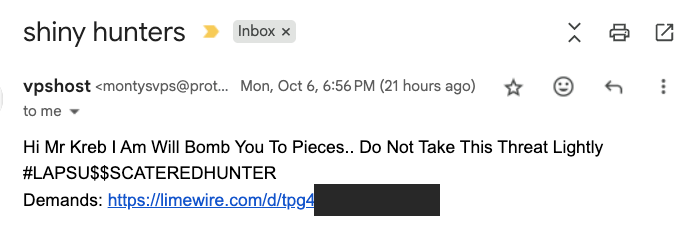
A screenshot of the phishing message linking to a malicious trojan disguised as a Windows screensaver file.
KrebsOnSecurity did not visit this link, but instead forwarded it to Mandiant, which confirmed that similar menacing missives were sent to employees at Mandiant and other security firms around the same time.
The link in the message fetches a malicious trojan disguised as a Windows screensaver file (Virustotal’s analysis on this malware is here). Simply viewing the booby-trapped screensaver on a Windows PC is enough to cause the bundled trojan to launch in the background.
Mandiant’s Austin Larsen said the trojan is a commercially available backdoor known as ASYNCRAT, a .NET-based backdoor that communicates using a custom binary protocol over TCP, and can execute shell commands and download plugins to extend its features.
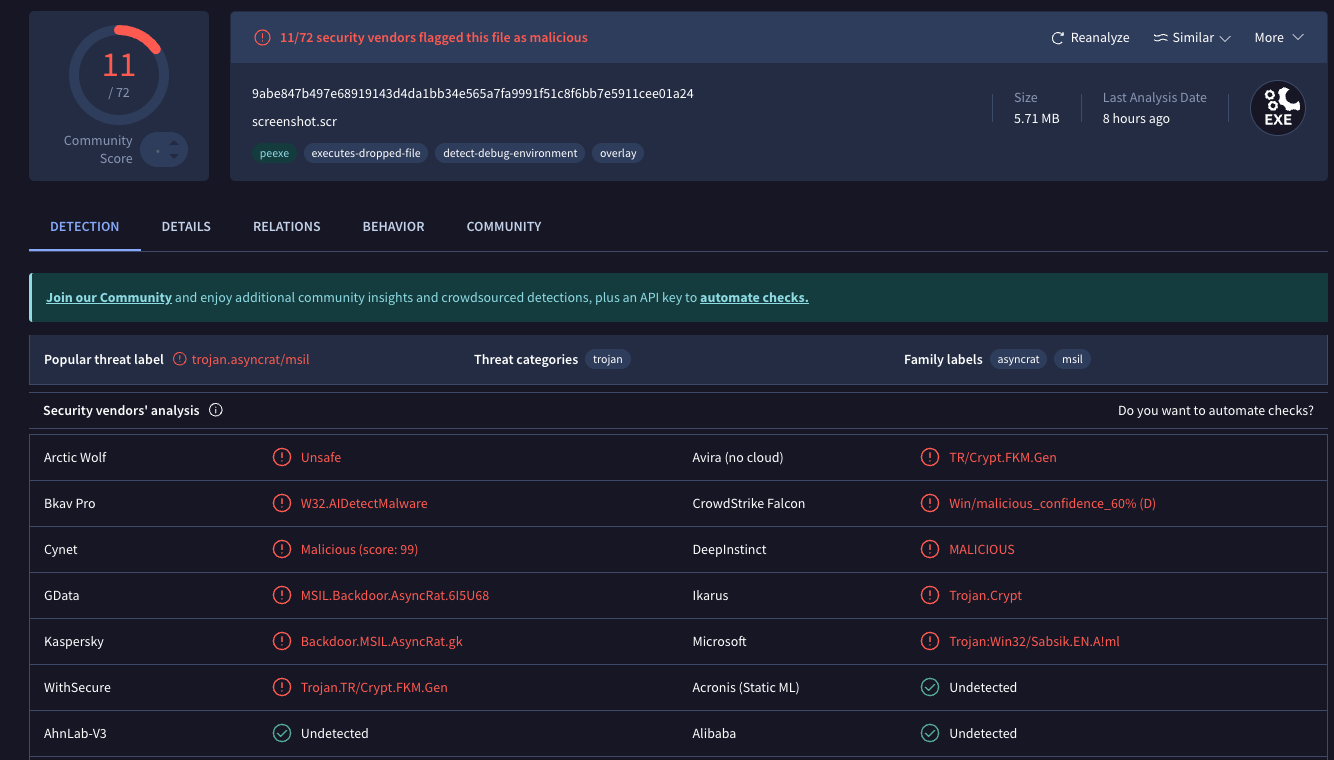
A scan of the malicious screensaver file at Virustotal.com shows it is detected as bad by nearly a dozen security and antivirus tools.
“Downloaded plugins may be executed directly in memory or stored in the registry,” Larsen wrote in an analysis shared via email. “Capabilities added via plugins include screenshot capture, file transfer, keylogging, video capture, and cryptocurrency mining. ASYNCRAT also supports a plugin that targets credentials stored by Firefox and Chromium-based web browsers.”
Malware-laced targeted emails are not out of character for certain members of the Scattered Lapsus$ Hunters, who have previously harassed and threatened security researchers and even law enforcement officials who are investigating and warning about the extent of their attacks.
With so many big data breaches and ransom attacks now coming from cybercrime groups operating on the Com, law enforcement agencies on both sides of the pond are under increasing pressure to apprehend the criminal hackers involved. In late September, prosecutors in the U.K. charged two alleged Scattered Spider members aged 18 and 19 with extorting at least $115 million in ransom payments from companies victimized by data theft.
U.S. prosecutors heaped their own charges on the 19 year-old in that duo — U.K. resident Thalha Jubair — who is alleged to have been involved in data ransom attacks against Marks & Spencer and Harrods, the British food retailer Co-op Group, and the 2023 intrusions at MGM Resorts and Caesars Entertainment. Jubair also was allegedly a key member of LAPSUS$, a cybercrime group that broke into dozens of technology companies beginning in late 2021.

A Mastodon post by Kevin Beaumont, lamenting the prevalence of major companies paying millions to extortionist teen hackers, refers derisively to Thalha Jubair as a part of an APT threat known as “Advanced Persistent Teenagers.”
In August, convicted Scattered Spider member and 20-year-old Florida man Noah Michael Urban was sentenced to 10 years in federal prison and ordered to pay roughly $13 million in restitution to victims.
In April 2025, a 23-year-old Scottish man thought to be an early Scattered Spider member was extradited from Spain to the U.S., where he is facing charges of wire fraud, conspiracy and identity theft. U.S. prosecutors allege Tyler Robert Buchanan and co-conspirators hacked into dozens of companies in the United States and abroad, and that he personally controlled more than $26 million stolen from victims.
Update, Oct. 8, 8:59 a.m. ET: A previous version of this story incorrectly referred to the malware sent by the reader as a Windows screenshot file. Rather, it is a Windows screensaver file.
The recent mass-theft of authentication tokens from Salesloft, whose AI chatbot is used by a broad swath of corporate America to convert customer interaction into Salesforce leads, has left many companies racing to invalidate the stolen credentials before hackers can exploit them. Now Google warns the breach goes far beyond access to Salesforce data, noting the hackers responsible also stole valid authentication tokens for hundreds of online services that customers can integrate with Salesloft, including Slack, Google Workspace, Amazon S3, Microsoft Azure, and OpenAI.

Salesloft says its products are trusted by 5,000+ customers. Some of the bigger names are visible on the company’s homepage.
Salesloft disclosed on August 20 that, “Today, we detected a security issue in the Drift application,” referring to the technology that powers an AI chatbot used by so many corporate websites. The alert urged customers to re-authenticate the connection between the Drift and Salesforce apps to invalidate their existing authentication tokens, but it said nothing then to indicate those tokens had already been stolen.
On August 26, the Google Threat Intelligence Group (GTIG) warned that unidentified hackers tracked as UNC6395 used the access tokens stolen from Salesloft to siphon large amounts of data from numerous corporate Salesforce instances. Google said the data theft began as early as Aug. 8, 2025 and lasted through at least Aug. 18, 2025, and that the incident did not involve any vulnerability in the Salesforce platform.
Google said the attackers have been sifting through the massive data haul for credential materials such as AWS keys, VPN credentials, and credentials to the cloud storage provider Snowflake.
“If successful, the right credentials could allow them to further compromise victim and client environments, as well as pivot to the victim’s clients or partner environments,” the GTIG report stated.
The GTIG updated its advisory on August 28 to acknowledge the attackers used the stolen tokens to access email from “a very small number of Google Workspace accounts” that were specially configured to integrate with Salesloft. More importantly, it warned organizations to immediately invalidate all tokens stored in or connected to their Salesloft integrations — regardless of the third-party service in question.
“Given GTIG’s observations of data exfiltration associated with the campaign, organizations using Salesloft Drift to integrate with third-party platforms (including but not limited to Salesforce) should consider their data compromised and are urged to take immediate remediation steps,” Google advised.
On August 28, Salesforce blocked Drift from integrating with its platform, and with its productivity platforms Slack and Pardot.
The Salesloft incident comes on the heels of a broad social engineering campaign that used voice phishing to trick targets into connecting a malicious app to their organization’s Salesforce portal. That campaign led to data breaches and extortion attacks affecting a number of companies including Adidas, Allianz Life and Qantas.
On August 5, Google disclosed that one of its corporate Salesforce instances was compromised by the attackers, which the GTIG has dubbed UNC6040 (“UNC” stands for “uncategorized threat group”). Google said the extortionists consistently claimed to be the threat group ShinyHunters, and that the group appeared to be preparing to escalate its extortion attacks by launching a data leak site.
ShinyHunters is an amorphous threat group known for using social engineering to break into cloud platforms and third-party IT providers, and for posting dozens of stolen databases to cybercrime communities like the now-defunct Breachforums.
The ShinyHunters brand dates back to 2020, and the group has been credited with or taken responsibility for dozens of data leaks that exposed hundreds of millions of breached records. The group’s member roster is thought to be somewhat fluid, drawing mainly from active denizens of the Com, a mostly English-language cybercrime community scattered across an ocean of Telegram and Discord servers.
Recorded Future’s Alan Liska told Bleeping Computer that the overlap in the “tools, techniques and procedures” used by ShinyHunters and the Scattered Spider extortion group likely indicate some crossover between the two groups.
To muddy the waters even further, on August 28 a Telegram channel that now has nearly 40,000 subscribers was launched under the intentionally confusing banner “Scattered LAPSUS$ Hunters 4.0,” wherein participants have repeatedly claimed responsibility for the Salesloft hack without actually sharing any details to prove their claims.
The Telegram group has been trying to attract media attention by threatening security researchers at Google and other firms. It also is using the channel’s sudden popularity to promote a new cybercrime forum called “Breachstars,” which they claim will soon host data stolen from victim companies who refuse to negotiate a ransom payment.
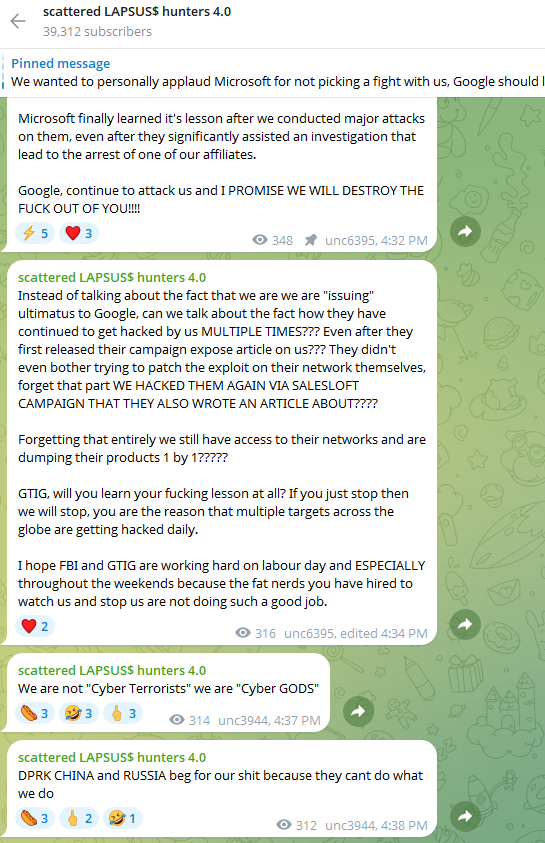
The “Scattered Lapsus$ Hunters 4.0” channel on Telegram now has roughly 40,000 subscribers.
But Austin Larsen, a principal threat analyst at Google’s threat intelligence group, said there is no compelling evidence to attribute the Salesloft activity to ShinyHunters or to other known groups at this time.
“Their understanding of the incident seems to come from public reporting alone,” Larsen told KrebsOnSecurity, referring to the most active participants in the Scattered LAPSUS$ Hunters 4.0 Telegram channel.
Joshua Wright, a senior technical director at Counter Hack, is credited with coining the term “authorization sprawl” to describe one key reason that social engineering attacks from groups like Scattered Spider and ShinyHunters so often succeed: They abuse legitimate user access tokens to move seamlessly between on-premises and cloud systems.
Wright said this type of attack chain often goes undetected because the attacker sticks to the resources and access already allocated to the user.
“Instead of the conventional chain of initial access, privilege escalation and endpoint bypass, these threat actors are using centralized identity platforms that offer single sign-on (SSO) and integrated authentication and authorization schemes,” Wright wrote in a June 2025 column. “Rather than creating custom malware, attackers use the resources already available to them as authorized users.”
It remains unclear exactly how the attackers gained access to all Salesloft Drift authentication tokens. Salesloft announced on August 27 that it hired Mandiant, Google Cloud’s incident response division, to investigate the root cause(s).
“We are working with Salesloft Drift to investigate the root cause of what occurred and then it’ll be up to them to publish that,” Mandiant Consulting CTO Charles Carmakal told Cyberscoop. “There will be a lot more tomorrow, and the next day, and the next day.”
A message posted on Monday to the homepage of the U.S. Cybersecurity & Infrastructure Security Agency (CISA) is the latest exhibit in the Trump administration’s continued disregard for basic cybersecurity protections. The message instructed recently-fired CISA employees to get in touch so they can be rehired and then immediately placed on leave, asking employees to send their Social Security number or date of birth in a password-protected email attachment — presumably with the password needed to view the file included in the body of the email.

The homepage of cisa.gov as it appeared on Monday and Tuesday afternoon.
On March 13, a Maryland district court judge ordered the Trump administration to reinstate more than 130 probationary CISA employees who were fired last month. On Monday, the administration announced that those dismissed employees would be reinstated but placed on paid administrative leave. They are among nearly 25,000 fired federal workers who are in the process of being rehired.
A notice covering the CISA homepage said the administration is making every effort to contact those who were unlawfully fired in mid-February.
“Please provide a password protected attachment that provides your full name, your dates of employment (including date of termination), and one other identifying factor such as date of birth or social security number,” the message reads. “Please, to the extent that it is available, attach any termination notice.”
The message didn’t specify how affected CISA employees should share the password for any attached files, so the implicit expectation is that employees should just include the plaintext password in their message.
Email is about as secure as a postcard sent through the mail, because anyone who manages to intercept the missive anywhere along its path of delivery can likely read it. In security terms, that’s the equivalent of encrypting sensitive data while also attaching the secret key needed to view the information.
What’s more, a great many antivirus and security scanners have trouble inspecting password-protected files, meaning the administration’s instructions are likely to increase the risk that malware submitted by cybercriminals could be accepted and opened by U.S. government employees.
The message in the screenshot above was removed from the CISA homepage Tuesday evening and replaced with a much shorter notice directing former CISA employees to contact a specific email address. But a slightly different version of the same message originally posted to CISA’s website still exists at the website for the U.S. Citizenship and Immigration Services, which likewise instructs those fired employees who wish to be rehired and put on leave to send a password-protected email attachment with sensitive personal data.

A message from the White House to fired federal employees at the U.S. Citizenship and Immigration Services instructs recipients to email personal information in a password-protected attachment.
This is hardly the first example of the administration discarding Security 101 practices in the name of expediency. Last month, the Central Intelligence Agency (CIA) sent an unencrypted email to the White House with the first names and first letter of the last names of recently hired CIA officers who might be easy to fire.
As cybersecurity journalist Shane Harris noted in The Atlantic, even those fragments of information could be useful to foreign spies.
“Over the weekend, a former senior CIA official showed me the steps by which a foreign adversary who knew only his first name and last initial could have managed to identify him from the single line of the congressional record where his full name was published more than 20 years ago, when he became a member of the Foreign Service,” Harris wrote. “The former official was undercover at the time as a State Department employee. If a foreign government had known even part of his name from a list of confirmed CIA officers, his cover would have been blown.”
The White House has also fired at least 100 intelligence staffers from the National Security Agency (NSA), reportedly for using an internal NSA chat tool to discuss their personal lives and politics. Testifying before the House Select Committee on the Communist Party earlier this month, the NSA’s former top cybersecurity official said the Trump administration’s attempts to mass fire probationary federal employees will be “devastating” to U.S. cybersecurity operations.
Rob Joyce, who spent 34 years at the NSA, told Congress how important those employees are in sustaining an aggressive stance against China in cyberspace.
“At my former agency, remarkable technical talent was recruited into developmental programs that provided intensive unique training and hands-on experience to cultivate vital skills,” Joyce told the panel. “Eliminating probationary employees will destroy a pipeline of top talent responsible for hunting and eradicating [Chinese] threats.”
Both the message to fired CISA workers and DOGE’s ongoing efforts to bypass vetted government networks for a faster Wi-Fi signal are emblematic of this administration’s overall approach to even basic security measures: To go around them, or just pretend they don’t exist for a good reason.
On Monday, The New York Times reported that U.S. Secret Service agents at the White House were briefly on alert last month when a trusted captain of Elon Musk’s “Department of Government Efficiency” (DOGE) visited the roof of the Eisenhower building inside the White House compound — to see about setting up a dish to receive satellite Internet access directly from Musk’s Starlink service.
The White House press secretary told The Times that Starlink had “donated” the service and that the gift had been vetted by the lawyer overseeing ethics issues in the White House Counsel’s Office. The White House claims the service is necessary because its wireless network is too slow.
Jake Williams, vice president for research and development at the cybersecurity consulting firm Hunter Strategy, told The Times “it’s super rare” to install Starlink or another internet provider as a replacement for existing government infrastructure that has been vetted and secured.
“I can’t think of a time that I have heard of that,” Williams said. “It introduces another attack point,” Williams said. “But why introduce that risk?”
Meanwhile, NBC News reported on March 7 that Starlink is expanding its footprint across the federal government.
“Multiple federal agencies are exploring the idea of adopting SpaceX’s Starlink for internet access — and at least one agency, the General Services Administration (GSA), has done so at the request of Musk’s staff, according to someone who worked at the GSA last month and is familiar with its network operations — despite a vow by Musk and Trump to slash the overall federal budget,” NBC wrote.
The longtime Musk employee who encountered the Secret Service on the roof in the White House complex was Christopher Stanley, the 33-year-old senior director for security engineering at X and principal security engineer at SpaceX.
On Monday, Bloomberg broke the news that Stanley had been tapped for a seat on the board of directors at the mortgage giant Fannie Mae. Stanley was added to the board alongside newly confirmed Federal Housing Finance Agency director Bill Pulte, the grandson of the late housing businessman and founder of PulteGroup — William J. Pulte.
In a nod to his new board role atop an agency that helps drive the nation’s $12 trillion mortgage market, Stanley retweeted a Bloomberg story about the hire with a smiley emoji and the comment “Tech Support.”

But earlier today, Bloomberg reported that Stanley had abruptly resigned from the Fannie board, and that details about the reason for his quick departure weren’t immediately clear. As first reported here last month, Stanley had a brush with celebrity on Twitter in 2015 when he leaked the user database for the DDoS-for-hire service LizardStresser, and soon faced threats of physical violence against his family.
My 2015 story on that leak did not name Stanley, but he exposed himself as the source by posting a video about it on his Youtube channel. A review of domain names registered by Stanley shows he went by the nickname “enKrypt,” and was the former owner of a pirated software and hacking forum called error33[.]net, as well as theC0re, a video game cheating community.
Stanley is one of more than 50 DOGE workers, mostly young men and women who have worked with one or more of Musk’s companies. The Trump administration remains dogged by questions about how many — if any — of the DOGE workers were put through the gauntlet of a thorough security background investigation before being given access to such sensitive government databases.
That’s largely because in one of his first executive actions after being sworn in for a second term on Jan. 20, President Trump declared that the security clearance process was simply too onerous and time-consuming, and that anyone so designated by the White House counsel would have full top secret/sensitive compartmented information (TS/SCI) clearances for up to six months. Translation: We accepted the risk, so TAH-DAH! No risk!
Presumably, this is the same counsel who saw no ethical concerns with Musk “donating” Starlink to the White House, or with President Trump summoning the media to film him hawking Cybertrucks and Teslas (a.k.a. “Teslers”) on the White House lawn last week.
Mr. Musk’s unelected role as head of an ad hoc executive entity that is gleefully firing federal workers and feeding federal agencies into “the wood chipper” has seen his Tesla stock price plunge in recent weeks, while firebombings and other vandalism attacks on property carrying the Tesla logo are cropping up across the U.S. and overseas and driving down Tesla sales.
President Trump and his attorney general Pam Bondi have dubiously asserted that those responsible for attacks on Tesla dealerships are committing “domestic terrorism,” and that vandals will be prosecuted accordingly. But it’s not clear this administration would recognize a real domestic security threat if it was ensconced squarely behind the Resolute Desk.
Or at the pinnacle of the Federal Bureau of Investigation (FBI). The Washington Post reported last month that Trump’s new FBI director Kash Patel was paid $25,000 last year by a film company owned by a dual U.S. Russian citizen that has made programs promoting “deep state” conspiracy theories pushed by the Kremlin.
“The resulting six-part documentary appeared on Tucker Carlson’s online network, itself a reliable conduit for Kremlin propaganda,” The Post reported. “In the film, Patel made his now infamous pledge to shut down the FBI’s headquarters in Washington and ‘open it up as a museum to the deep state.'”
When the head of the FBI is promising to turn his own agency headquarters into a mocking public exhibit on the U.S. National Mall, it may seem silly to fuss over the White House’s clumsy and insulting instructions to former employees they unlawfully fired.
Indeed, one consistent feedback I’ve heard from a subset of readers here is something to this effect: “I used to like reading your stuff more when you weren’t writing about politics all the time.”
My response to that is: “Yeah, me too.” It’s not that I’m suddenly interested in writing about political matters; it’s that various actions by this administration keep intruding on my areas of coverage.
A less charitable interpretation of that reader comment is that anyone still giving such feedback is either dangerously uninformed, being disingenuous, or just doesn’t want to keep being reminded that they’re on the side of the villains, despite all the evidence showing it.
Article II of the U.S. Constitution unambiguously states that the president shall take care that the laws be faithfully executed. But almost from Day One of his second term, Mr. Trump has been acting in violation of his sworn duty as president by choosing not to enforce laws passed by Congress (TikTok ban, anyone?), by freezing funds already allocated by Congress, and most recently by flouting a federal court order while simultaneously calling for the impeachment of the judge who issued it. Sworn to uphold, protect and defend The Constitution, President Trump appears to be creating new constitutional challenges with almost each passing day.
When Mr. Trump was voted out of office in November 2020, he turned to baseless claims of widespread “election fraud” to explain his loss — with deadly and long-lasting consequences. This time around, the rallying cry of DOGE and White House is “government fraud,” which gives the administration a certain amount of cover for its actions among a base of voters that has long sought to shrink the size and cost of government.
In reality, “government fraud” has become a term of derision and public scorn applied to anything or anyone the current administration doesn’t like. If DOGE and the White House were truly interested in trimming government waste, fraud and abuse, they could scarcely do better than consult the inspectors general fighting it at various federal agencies.
After all, the inspectors general likely know exactly where a great deal of the federal government’s fiscal skeletons are buried. Instead, Mr. Trump fired at least 17 inspectors general, leaving the government without critical oversight of agency activities. That action is unlikely to stem government fraud; if anything, it will only encourage such activity.
As Techdirt founder Mike Masnick noted in a recent column “Why Techdirt is Now a Democracy Blog (Whether We Like it or Not),” when the very institutions that made American innovation possible are being systematically dismantled, it’s not a “political” story anymore: It’s a story about whether the environment that enabled all the other stories we cover will continue to exist.
“This is why tech journalism’s perspective is so crucial right now,” Masnick wrote. “We’ve spent decades documenting how technology and entrepreneurship can either strengthen or undermine democratic institutions. We understand the dangers of concentrated power in the digital age. And we’ve watched in real-time as tech leaders who once championed innovation and openness now actively work to consolidate control and dismantle the very systems that enabled their success.”
“But right now, the story that matters most is how the dismantling of American institutions threatens everything else we cover,” Masnick continued. “When the fundamental structures that enable innovation, protect civil liberties, and foster open dialogue are under attack, every other tech policy story becomes secondary.”
One month into his second term, President Trump’s actions to shrink the government through mass layoffs, firings and withholding funds allocated by Congress have thrown federal cybersecurity and consumer protection programs into disarray. At the same time, agencies are battling an ongoing effort by the world’s richest man to wrest control over their networks and data.

Image: Shutterstock. Greg Meland.
The Trump administration has fired at least 130 employees at the federal government’s foremost cybersecurity body — the Cybersecurity and Infrastructure Security Agency (CISA). Those dismissals reportedly included CISA staff dedicated to securing U.S. elections, and fighting misinformation and foreign influence operations.
Earlier this week, technologists with Elon Musk’s Department of Government Efficiency (DOGE) arrived at CISA and gained access to the agency’s email and networked files. Those DOGE staffers include Edward “Big Balls” Coristine, a 19-year-old former denizen of the “Com,” an archipelago of Discord and Telegram chat channels that function as a kind of distributed cybercriminal social network.
The investigative journalist Jacob Silverman writes that Coristine is the grandson of Valery Martynov, a KGB double agent who spied for the United States. Silverman recounted how Martynov’s wife Natalya Martynova moved to the United States with her two children after her husband’s death.
“Her son became a Virginia police officer who sometimes posts comments on blogs about his historically famous father,” Silverman wrote. “Her daughter became a financial professional who married Charles Coristine, the proprietor of LesserEvil, a snack company. Among their children is a 19-year-old young man named Edward Coristine, who currently wields an unknown amount of power and authority over the inner-workings of our federal government.”
Another member of DOGE is Christopher Stanley, formerly senior director for security engineering at X and principal security engineer at Musk’s SpaceX. Stanley, 33, had a brush with celebrity on Twitter in 2015 when he leaked the user database for the DDoS-for-hire service LizardStresser, and soon faced threats of physical violence against his family.
My 2015 story on that leak did not name Stanley, but he exposed himself as the source by posting a video about it on his Youtube channel. A review of domain names registered by Stanley shows he went by the nickname “enKrypt,” and was the former owner of a pirated software and hacking forum called error33[.]net, as well as theC0re, a video game cheating community.
DOGE has been steadily gaining sensitive network access to federal agencies that hold a staggering amount of personal and financial information on Americans, including the Social Security Administration (SSA), the Department of Homeland Security, the Office of Personnel Management (OPM), and the Treasury Department.
Most recently, DOGE has sought broad access to systems at the Internal Revenue Service that contain the personal tax information on millions of Americans, including how much individuals earn and owe, property information, and even details related to child custody agreements. The New York Times reported Friday that the IRS had reached an agreement whereby a single DOGE employee — 25-year-old Gavin Kliger — will be allowed to see only anonymized taxpayer information.
The rapidity with which DOGE has rifled through one federal database after another in the name of unearthing “massive fraud” by government agencies has alarmed many security experts, who warned that DOGE’s actions bypassed essential safeguards and security measures.
“The most alarming aspect isn’t just the access being granted,” wrote Bruce Schneier and Davi Ottenheimer, referring to DOGE as a national cyberattack. “It’s the systematic dismantling of security measures that would detect and prevent misuse—including standard incident response protocols, auditing, and change-tracking mechanisms—by removing the career officials in charge of those security measures and replacing them with inexperienced operators.”
Jacob Williams is a former hacker with the U.S. National Security Agency who now works as managing director of the cybersecurity firm Hunter Labs. Williams kicked a virtual hornet’s nest last week when he posted on LinkedIn that the network incursions by DOGE were “a bigger threat to U.S. federal government information systems than China.”
Williams said while he doesn’t believe anyone at DOGE would intentionally harm the integrity and availability of these systems, it’s widely reported (and not denied) that DOGE introduced code changes into multiple federal IT systems. These code changes, he maintained, are not following the normal process for vetting and review given to federal government IT systems.
“For those thinking ‘I’m glad they aren’t following the normal federal government IT processes, those are too burdensome’ I get where you’re coming from,” Williams wrote. “But another name for ‘red tape’ are ‘controls.’ If you’re comfortable bypassing controls for the advancement of your agenda, I have questions – mostly about whether you do this in your day job too. Please tag your employer letting them know your position when you comment that controls aren’t important (doubly so if you work in cybersecurity). All satire aside, if you’re comfortable abandoning controls for expediency, I implore you to decide where the line is that you won’t cross in that regard.”
The DOGE website’s “wall of receipts” boasts that Musk and his team have saved the federal government more than $55 billion through staff reductions, lease cancellations and terminated contracts. But a team of reporters at The New York Times found the math that could back up those checks is marred with accounting errors, incorrect assumptions, outdated data and other mistakes.
For example, DOGE claimed it saved $8 billion in one contract, when the total amount was actually $8 million, The Times found.
“Some contracts the group claims credit for were double- or triple-counted,” reads a Times story with six bylines. “Another initially contained an error that inflated the totals by billions of dollars. While the DOGE team has surely cut some number of billions of dollars, its slapdash accounting adds to a pattern of recklessness by the group, which has recently gained access to sensitive government payment systems.”
So far, the DOGE website does not inspire confidence: We learned last week that the doge.gov administrators somehow left their database wide open, allowing someone to publish messages that ridiculed the site’s insecurity.
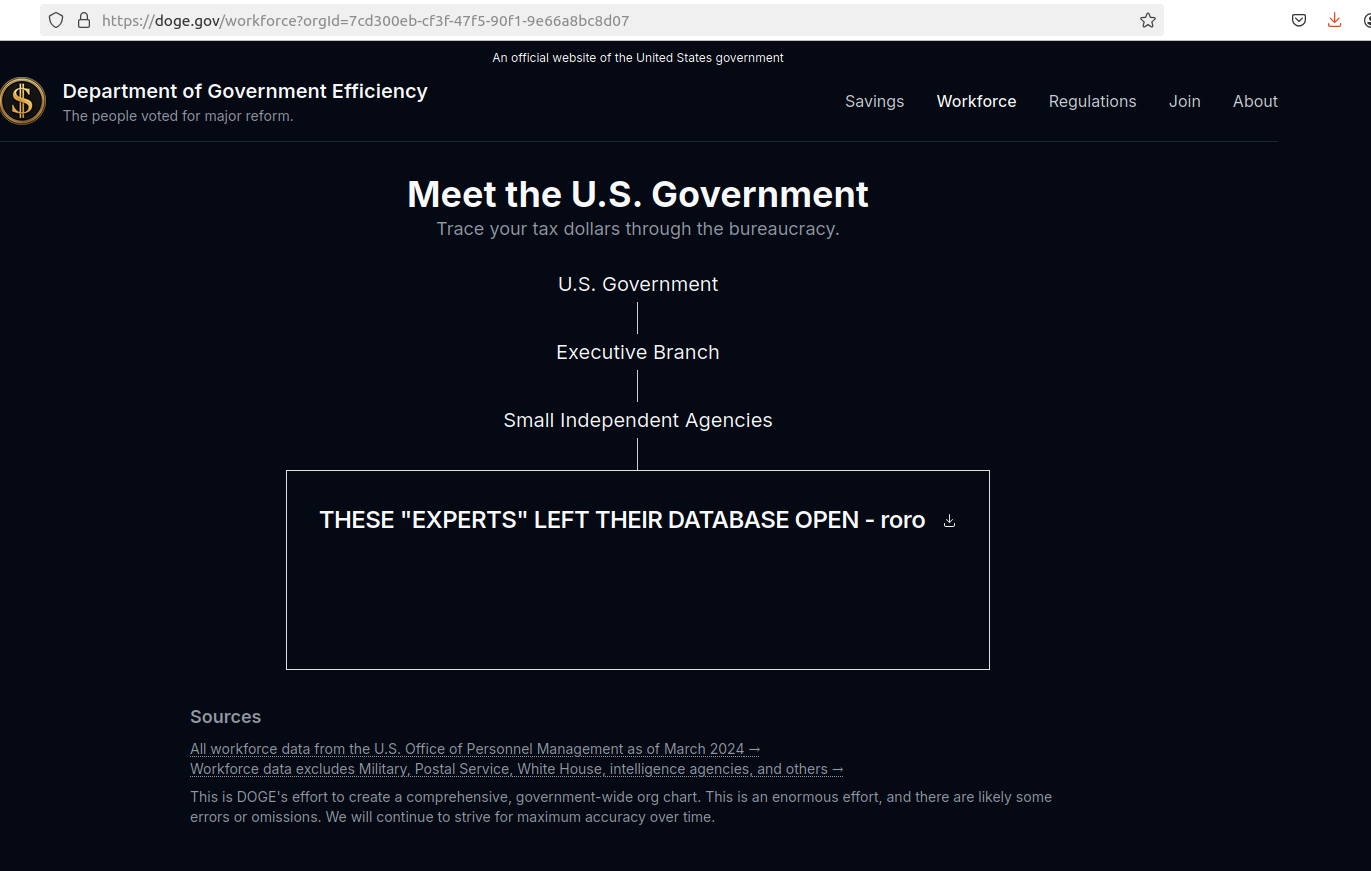
A screenshot of the DOGE website after it was defaced with the message: “These ‘experts’ left their database open – roro”
Trump’s efforts to grab federal agencies by their data has seen him replace career civil servants who refused to allow DOGE access to agency networks. CNN reports that Michelle King, acting commissioner of the Social Security Administration for more than 30 years, was shown the door after she denied DOGE access to sensitive information.
King was replaced by Leland Dudek, formerly a senior advisor in the SSA’s Office of Program Integrity. This week, Dudek posted a now-deleted message on LinkedIn acknowledging he had been placed on administrative leave for cooperating with DOGE.
“I confess,” Dudek wrote. “I bullied agency executives, shared executive contact information, and circumvented the chain of command to connect DOGE with the people who get stuff done. I confess. I asked where the fat was and is in our contracts so we can make the right tough choices.”
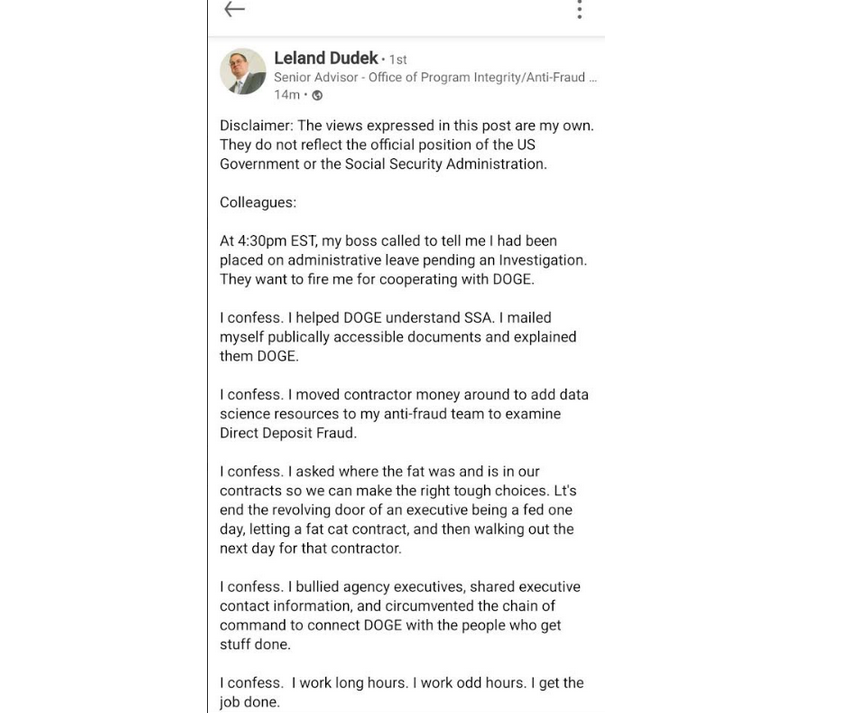
Dudek’s message on LinkedIn.
According to Wired, the National Institute of Standards and Technology (NIST) was also bracing this week for roughly 500 staffers to be fired, which could have serious impacts on NIST’s cybersecurity standards and software vulnerability tracking work.
“And cuts last week at the US Digital Service included the cybersecurity lead for the central Veterans Affairs portal, VA.gov, potentially leaving VA systems and data more vulnerable without someone in his role,” Wired’s Andy Greenberg and Lily Hay Newman wrote.
NextGov reports that Trump named the Department of Defense’s new chief information security officer: Katie Arrington, a former South Carolina state lawmaker who helped steer Pentagon cybersecurity contracting policy before being put on leave amid accusations that she disclosed classified data from a military intelligence agency.
NextGov notes that the National Security Agency suspended her clearance in 2021, although the exact reasons that led to the suspension and her subsequent leave were classified. Arrington argued that the suspension was a politically motivated effort to silence her.
Trump also appointed the former chief operating officer of the Republican National Committee as the new head of the Office of National Cyber Director. Sean Cairncross, who has no formal experience in technology or security, will be responsible for coordinating national cybersecurity policy, advising the president on cyber threats, and ensuring a unified federal response to emerging cyber-risks, Politico writes.
DarkReading reports that Cairncross would share responsibility for advising the president on cyber matters, along with the director of cyber at the White House National Security Council (NSC) — a group that advises the president on all matters security related, and not just cyber.
The president also ordered staffers at the Consumer Financial Protection Bureau (CFPB) to stop most work. Created by Congress in 2011 to be a clearinghouse of consumer complaints, the CFPB has sued some of the nation’s largest financial institutions for violating consumer protection laws.
The CFPB says its actions have put nearly $18 billion back in Americans’ pockets in the form of monetary compensation or canceled debts, and imposed $4 billion in civil money penalties against violators. The CFPB’s homepage has featured a “404: Page not found” error for weeks now.
Trump has appointed Russell Vought, the architect of the conservative policy playbook Project 2025, to be the CFPB’s acting director. Vought has publicly favored abolishing the agency, as has Elon Musk, whose efforts to remake X into a payments platform would otherwise be regulated by the CFPB.
The New York Times recently published a useful graphic showing all of the government staffing changes, including the firing of several top officials, affecting agencies with federal investigations into or regulatory battles with Musk’s companies. Democrats on the House Judiciary Committee also have released a comprehensive account (PDF) of Musk’s various conflicts of interest.
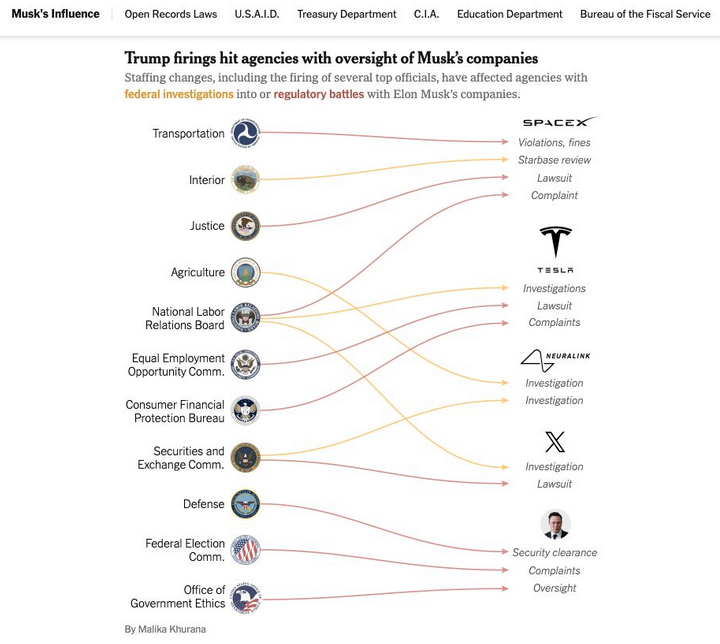
Image: nytimes.com
As the Times notes, Musk and his companies have repeatedly failed to comply with federal reporting protocols aimed at protecting state secrets, and these failures have prompted at least three federal reviews. Those include an inquiry launched last year by the Defense Department’s Office of Inspector General. Four days after taking office, Trump fired the DoD inspector general along with 17 other inspectors general.
The Trump administration also shifted the enforcement priorities of the U.S. Securities and Exchange Commission (SEC) away from prosecuting misconduct in the cryptocurrency sector, reassigning lawyers and renaming the unit to focus more on “cyber and emerging technologies.”
Reuters reports that the former SEC chair Gary Gensler made fighting misconduct in a sector he termed the “wild west” a priority for the agency, targeting not only cryptocurrency fraudsters but also the large firms that facilitate trading such as Coinbase.
On Friday, Coinbase said the SEC planned to withdraw its lawsuit against the crypto exchange. Also on Friday, the cryptocurrency exchange Bybit announced on X that a cybersecurity breach led to the theft of more than $1.4 billion worth of cryptocurrencies — making it the largest crypto heist ever.
On Feb. 10, Trump ordered executive branch agencies to stop enforcing the U.S. Foreign Corrupt Practices Act, which froze foreign bribery investigations, and even allows for “remedial actions” of past enforcement actions deemed “inappropriate.”
Trump’s action also disbanded the Kleptocracy Asset Recovery Initiative and KleptoCapture Task Force — units which proved their value in corruption cases and in seizing the assets of sanctioned Russian oligarchs — and diverted resources away from investigating white-collar crime.
That’s according to the independent Organized Crime and Corruption Reporting Project (OCCRP), an investigative journalism outlet that until very recently was funded in part by the U.S. Agency for International Development (USAID).
The OCCRP lost nearly a third of its funding and was forced to lay off 43 reporters and staff after Trump moved to shutter USAID and freeze its spending. NBC News reports the Trump administration plans to gut the agency and leave fewer than 300 staffers on the job out of the current 8,000 direct hires and contractors.
The Global Investigative Journalism Network wrote this week that the sudden hold on USAID foreign assistance funding has frozen an estimated $268 million in agreed grants for independent media and the free flow of information in more than 30 countries — including several under repressive regimes.
Elon Musk has called USAID “a criminal organization” without evidence, and promoted fringe theories on his social media platform X that the agency operated without oversight and was rife with fraud. Just months before the election, USAID’s Office of Inspector General announced an investigation into USAID’s oversight of Starlink satellite terminals provided to the government of Ukraine.
KrebsOnSecurity this week heard from a trusted source that all outgoing email from USAID now carries a notation of “sensitive but unclassified,” a designation that experts say could make it more difficult for journalists and others to obtain USAID email records under the Freedom of Information Act (FOIA). On Feb. 20, Fedscoop reported also hearing the same thing from multiple sources, noting that the added message cannot be seen by senders until after the email is sent.
On Feb. 18, Trump issued an executive order declaring that only the U.S. attorney general and the president can provide authoritative interpretations of the law for the executive branch, and that this authority extends to independent agencies operating under the executive branch.
Trump is arguing that Article II, Clause 1 of the Constitution vests this power with the president. However, jurist.org writes that Article II does not expressly state the president or any other person in the executive branch has the power to interpret laws.
“The article states that the president is required to ‘take care that the laws be faithfully executed,'” Juris noted. “Jurisdiction to interpret laws and determine constitutionality belongs to the judicial branch under Article III. The framers of the Constitution designed the separation of duties to prevent any single branch of government from becoming too powerful.”
The executive order requires all agencies to submit to “performance standards and management objectives” to be established by the White House Office of Management and Budget, and to report periodically to the president.
Those performance metrics are already being requested: Employees at multiple federal agencies on Saturday reported receiving an email from the Office of Personnel Management ordering them to reply with a set of bullet points justifying their work for the past week.
“Please reply to this email with approx. 5 bullets of what you accomplished last week and cc your manager,” the notice read. “Please do not send any classified information, links, or attachments. Deadline is this Monday at 11:59 p.m. EST.”
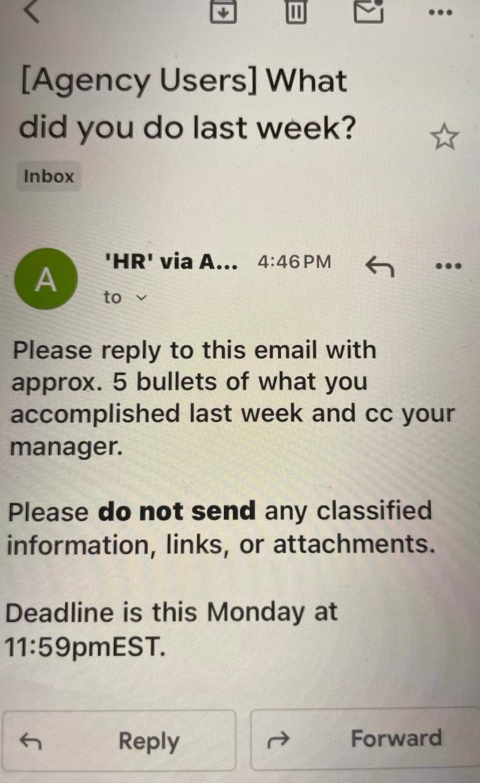
An email sent by the OPM to more than two million federal employees late in the afternoon EST on Saturday, Feb. 22.
In a social media post Saturday, Musk said the directive came at the behest of President Trump, and that failure to respond would be taken as a resignation. Meanwhile, Bloomberg writes the Department of Justice has been urging employees to hold off replying out of concern doing so could trigger ethics violations. The National Treasury Employees Union also is advising its employees not to respond.
A legal battle over Trump’s latest executive order is bound to join more than 70 other lawsuits currently underway to halt the administration’s efforts to massively reduce the size of the federal workforce through layoffs, firings and attrition.
On Feb. 15, the president posted on social media, “He who saves his Country does not violate any Law,” citing a quote often attributed to the French dictator Napoleon Bonaparte. Four days later, Trump referred to himself as “the king” on social media, while the White House nonchalantly posted an illustration of him wearing a crown.
Trump has been publicly musing about running for an unconstitutional third-term in office, a statement that some of his supporters dismiss as Trump just trying to rile his liberal critics. However, just days after Trump began his second term, Rep. Andy Ogles (R-Tenn.) introduced a bill to amend the Constitution so that Trump — and any other future president — can be elected to serve a third term.
This week at the Conservative Political Action Conference (CPAC), Rep. Ogles reportedly led a group of Trump supporters calling itself the “Third Term Project,” which is trying to gain support for the bill from GOP lawmakers. The event featured images of Trump depicted as Caesar.

A banner at the CPAC conference this week in support of The Third Term Project, a group of conservatives trying to gain support for a bill to amend the Constitution and allow Trump to run for a third term.
Russia continues to be among the world’s top exporters of cybercrime, narcotics, money laundering, human trafficking, disinformation, war and death, and yet the Trump administration has suddenly broken with the Western world in normalizing relations with Moscow.
This week President Trump stunned U.S. allies by repeating Kremlin talking points that Ukraine is somehow responsible for Russia’s invasion, and that Ukrainian President Volodymyr Zelensky is a “dictator.” The president repeated these lies even as his administration is demanding that Zelensky give the United States half of his country’s mineral wealth in exchange for a promise that Russia will cease its territorial aggression there.
President Trump’s servility toward an actual dictator — Russian President Vladimir Putin — does not bode well for efforts to improve the cybersecurity of U.S. federal IT networks, or the private sector systems on which the government is largely reliant. In addition, this administration’s baffling moves to alienate, antagonize and sideline our closest allies could make it more difficult for the United States to secure their ongoing cooperation in cybercrime investigations.
It’s also startling how closely DOGE’s approach so far hews to tactics typically employed by ransomware gangs: A group of 20-somethings with names like “Big Balls” shows up on a weekend and gains access to your servers, deletes data, locks out key staff, takes your website down, and prevents you from serving customers.
When the federal executive starts imitating ransomware playbooks against its own agencies while Congress largely gazes on in either bewilderment or amusement, we’re in four-alarm fire territory. At least in theory, one can negotiate with ransomware purveyors.
A great many readers this month reported receiving alerts that their Social Security Number, name, address and other personal information were exposed in a breach at a little-known but aptly-named consumer data broker called NationalPublicData.com. This post examines what we know about a breach that has exposed hundreds of millions of consumer records. We’ll also take a closer look at the data broker that got hacked — a background check company founded by an actor and retired sheriff’s deputy from Florida.

On July 21, 2024, denizens of the cybercrime community Breachforums released more than 4 terabytes of data they claimed was stolen from nationalpublicdata.com, a Florida-based company that collects data on consumers and processes background checks.
The breach tracking service HaveIBeenPwned.com and the cybercrime-focused Twitter account vx-underground both concluded the leak is the same information first put up for sale in April 2024 by a prolific cybercriminal who goes by the name “USDoD.”
On April 7, USDoD posted a sales thread on Breachforums for four terabytes of data — 2.9 billion rows of records — they claimed was taken from nationalpublicdata.com. The snippets of stolen data that USDoD offered as teasers showed rows of names, addresses, phone numbers, and Social Security Numbers (SSNs). Their asking price? $3.5 million.
Many media outlets mistakenly reported that the National Public data breach affects 2.9 billion people (that figure actually refers to the number of rows in the leaked data sets). HaveIBeenPwned.com’s Troy Hunt analyzed the leaked data and found it is a somewhat disparate collection of consumer and business records, including the real names, addresses, phone numbers and SSNs of millions of Americans (both living and deceased), and 70 million rows from a database of U.S. criminal records.
Hunt said he found 137 million unique email addresses in the leaked data, but stressed that there were no email addresses in the files containing SSN records.
“If you find yourself in this data breach via HaveIBeenPwned.com, there’s no evidence your SSN was leaked, and if you’re in the same boat as me, the data next to your record may not even be correct.”
Nationalpublicdata.com publicly acknowledged a breach in a statement on Aug. 12, saying “there appears to have been a data security incident that may have involved some of your personal information. The incident appears to have involved a third-party bad actor that was trying to hack into data in late December 2023, with potential leaks of certain data in April 2024 and summer 2024.”
The company said the information “suspected of being breached” contained name, email address, phone number, social security number, and mailing address(es).
“We cooperated with law enforcement and governmental investigators and conducted a review of the potentially affected records and will try to notify you if there are further significant developments applicable to you,” the statement continues. “We have also implemented additional security measures in efforts to prevent the reoccurrence of such a breach and to protect our systems.”
Hunt’s analysis didn’t say how many unique SSNs were included in the leaked data. But according to researchers at Atlas Data Privacy Corp., there are 272 million unique SSNs in the entire records set.
Atlas found most records have a name, SSN, and home address, and that approximately 26 percent of those records included a phone number. Atlas said they verified 5,000 addresses and phone numbers, and found the records pertain to people born before Jan. 1, 2002 (with very few exceptions).
If there is a tiny silver lining to the breach it is this: Atlas discovered that many of the records related to people who are now almost certainly deceased. They found the average age of the consumer in these records is 70, and fully two million records are related to people whose date of birth would make them more than 120 years old today.
Where did National Public Data get its consumer data? The company’s website doesn’t say, but it is operated by an entity in Coral Springs, Fla. called Jerico Pictures Inc. The website for Jerico Pictures is not currently responding. However, cached versions of it at archive.org show it is a film studio with offices in Los Angeles and South Florida.
The Florida Secretary of State says Jerico Pictures is owned by Salvatore (Sal) Verini Jr., a retired deputy with the Broward County Sheriff’s office. The Secretary of State also says Mr. Verini is or was a founder of several other Florida companies, including National Criminal Data LLC, Twisted History LLC, Shadowglade LLC and Trinity Entertainment Inc., among others.
Mr. Verini did not respond to multiple requests for comment. Cached copies of Mr. Verini’s vanity domain salvatoreverini.com recount his experience in acting (e.g. a role in a 1980s detective drama with Burt Reynolds) and more recently producing dramas and documentaries for several streaming channels.

Sal Verini’s profile page at imdb.com.
Pivoting on the email address used to register that vanity domain, DomainTools.com finds several other domains whose history offers a clearer picture of the types of data sources relied upon by National Public Data.
One of those domains is recordscheck.net (formerly recordscheck.info), which advertises “instant background checks, SSN traces, employees screening and more.” Another now-defunct business tied to Mr. Verini’s email — publicrecordsunlimited.com — said it obtained consumer data from a variety of sources, including: birth, marriage and death records; voting records; professional licenses; state and federal criminal records.

The homepage for publicrecordsunlimited.com, per archive.org circa 2017.
It remains unclear how thieves originally obtained these records from National Public Data. KrebsOnSecurity sought comment from USDoD, who is perhaps best known for hacking into Infragard, an FBI program that facilitates information sharing about cyber and physical threats with vetted people in the private sector.
USDoD said they indeed sold the same data set that was leaked on Breachforums this past month, but that the person who leaked the data did not obtain it from them. USDoD said the data stolen from National Public Data had traded hands several times since it was initially stolen in December 2023.
“The database has been floating around for a while,” USDoD said. “I was not the first one to get it.”
USDoD said the person who originally stole the data from NPD was a hacker who goes by the handle SXUL. That user appears to have deleted their Telegram account several days ago, presumably in response to intense media coverage of the breach.
Data brokers like National Public Data typically get their information by scouring federal, state and local government records. Those government files include voting registries, property filings, marriage certificates, motor vehicle records, criminal records, court documents, death records, professional licenses, bankruptcy filings, and more.
Americans may believe they have the right to opt out of having these records collected and sold to anyone. But experts say these underlying sources of information — the above-mentioned “public” records — are carved out from every single state consumer privacy law. This includes California’s privacy regime, which is often held up as the national leader in state privacy regulations.
You see, here in America, virtually anyone can become a consumer data broker. And with few exceptions, there aren’t any special requirements for brokers to show that they actually care about protecting the data they collect, store, repackage and sell so freely.
In February 2023, PeopleConnect, the owners of the background search services TruthFinder and Instant Checkmate, acknowledged a breach affecting 20 million customers who paid the data brokers to run background checks. The data exposed included email addresses, hashed passwords, first and last names, and phone numbers.
In 2019, malicious hackers stole data on more than 1.5 billion people from People Data Labs, a San Francisco data broker whose people-search services linked hundreds of millions of email addresses, LinkedIn and Facebook profiles and more than 200 million valid cell phone numbers.
These data brokers are the digital equivalent of massive oil tankers wandering the coast without GPS or an anchor, because when they get hacked, the effect is very much akin to the ecological and economic fallout from a giant oil spill.
It’s an apt analogy because the dissemination of so much personal data all at once has ripple effects for months and years to come, as this information invariably feeds into a vast underground ocean of scammers who are already equipped and staffed to commit identity theft and account takeovers at scale.
It’s also apt because much like with real-life oil spills, the cleanup costs and effort from data spills — even just vast collections of technically “public” documents like the NPD corpus — can be enormous, and most of the costs associated with that fall to consumers, directly or indirectly.
Should you worry that your SSN and other personal data might be exposed in this breach? That isn’t necessary for people who’ve been following the advice here for years, which is to freeze one’s credit file at each of the major consumer reporting bureaus. Having a freeze on your files makes it much harder for identity thieves to create new accounts in your name, and it limits who can view your credit information.
The main reason I recommend the freeze is that all of the information ID thieves need to assume your identity is now broadly available from multiple sources, thanks to the multiplicity of data breaches we’ve seen involving SSN data and other key static data points about people.
But beyond that, there are numerous cybercriminal services that offer detailed background checks on consumers, including full SSNs. These services are powered by compromised accounts at data brokers that cater to private investigators and law enforcement officials, and some are now fully automated via Telegram instant message bots. Meaning, if you’re an American who hasn’t frozen their credit files and you haven’t yet experienced some form of new account fraud, the ID thieves probably just haven’t gotten around to you yet.
All Americans are also entitled to obtain a free copy of their credit report weekly from each of the three major credit bureaus. It used to be that consumers were allowed one free report from each of the bureaus annually, but in October 2023 the Federal Trade Commission announced the bureaus had permanently extended a program that lets you check your credit report once a week for free.
If you haven’t done this in a while, now would be an excellent time to order your files. To place a freeze, you need to create an account at each of the three major reporting bureaus, Equifax, Experian and TransUnion. Once you’ve established an account, you should be able to then view and freeze your credit file. Dispute any inaccuracies you may find. If you spot errors, such as random addresses and phone numbers you don’t recognize, do not ignore them: Identity theft and new account fraud are not problems that get easier to solve by letting them fester.
Mr. Verini probably didn’t respond to requests for comment because his company is now the subject of a class-action lawsuit (NB: the lawsuit also erroneously claims 3 billion people were affected). These lawsuits are practically inevitable now after a major breach, but they also have the unfortunate tendency to let regulators and lawmakers off the hook.
Almost every time there’s a major breach of SSN data, Americans are offered credit monitoring services. Most of the time, those services come from one of the three major consumer credit bureaus, the same companies that profit by compiling and selling incredibly detailed dossiers on consumers’ financial lives. The same companies that use dark patterns to trick people into paying for “credit lock” services that achieve a similar result as a freeze but still let the bureaus sell your data to their partners.
But class-actions alone will not drive us toward a national conversation about what needs to change. Americans currently have very few rights to opt out of the personal and financial surveillance, data collection and sale that is pervasive in today’s tech-based economy.
The breach at National Public Data may not be the worst data breach ever. But it does present yet another opportunity for this country’s leaders to acknowledge that the SSN has completely failed as a measure of authentication or authorization. It was never a good idea to use as an authenticator to begin with, and it is certainly no longer suitable for this purpose.
The truth is that these data brokers will continue to proliferate and thrive (and get hacked and relieved of their data) until Congress begins to realize it’s time for some consumer privacy and data protection laws that are relevant to life in the 21st century.
Further reporting: National Public Data Published Its Own Passwords
Update, Aug. 16, 8:00 a.m. ET: Corrected the story to note that consumers can now obtain a free credit report from each of the three consumer reporting bureaus weekly, instead of just annually.
Update, Aug. 23, 12:33 p.m. ET: Added link to latest story on NPD breach.

Retrieves relevant subdomains for the target website and consolidates them into a whitelist. These subdomains can be utilized during the scraping process.
Site-wide Link Discovery:
Collects all links throughout the website based on the provided whitelist and the specified max_depth.
Form and Input Extraction:
Identifies all forms and inputs found within the extracted links, generating a JSON output. This JSON output serves as a foundation for leveraging the XSS scanning capability of the tool.
XSS Scanning:
Note:
The scanning functionality is currently inactive on SPA (Single Page Application) web applications, and we have only tested it on websites developed with PHP, yielding remarkable results. In the future, we plan to incorporate these features into the tool.
Note:
This tool maintains an up-to-date list of file extensions that it skips during the exploration process. The default list includes common file types such as images, stylesheets, and scripts (
".css",".js",".mp4",".zip","png",".svg",".jpeg",".webp",".jpg",".gif"). You can customize this list to better suit your needs by editing the setting.json file..
$ git clone https://github.com/joshkar/X-Recon
$ cd X-Recon
$ python3 -m pip install -r requirements.txt
$ python3 xr.py
You can use this address in the Get URL section
http://testphp.vulnweb.com
Retrieve and display information about active user sessions on remote computers. No admin privileges required.
The tool leverages the remote registry service to query the HKEY_USERS registry hive on the remote computers. It identifies and extracts Security Identifiers (SIDs) associated with active user sessions, and translates these into corresponding usernames, offering insights into who is currently logged in.
If the -CheckAdminAccess switch is provided, it will gather sessions by authenticating to targets where you have local admin access using Invoke-WMIRemoting (which most likely will retrieve more results)
It's important to note that the remote registry service needs to be running on the remote computer for the tool to work effectively. In my tests, if the service is stopped but its Startup type is configured to "Automatic" or "Manual", the service will start automatically on the target computer once queried (this is native behavior), and sessions information will be retrieved. If set to "Disabled" no session information can be retrieved from the target.
iex(new-object net.webclient).downloadstring('https://raw.githubusercontent.com/Leo4j/Invoke-SessionHunter/main/Invoke-SessionHunter.ps1')
If run without parameters or switches it will retrieve active sessions for all computers in the current domain by querying the registry
Invoke-SessionHunter
Gather sessions by authenticating to targets where you have local admin access
Invoke-SessionHunter -CheckAsAdmin
You can optionally provide credentials in the following format
Invoke-SessionHunter -CheckAsAdmin -UserName "ferrari\Administrator" -Password "P@ssw0rd!"
You can also use the -FailSafe switch, which will direct the tool to proceed if the target remote registry becomes unresponsive.
This works in cobination with -Timeout | Default = 2, increase for slower networks.
Invoke-SessionHunter -FailSafe
Invoke-SessionHunter -FailSafe -Timeout 5
Use the -Match switch to show only targets where you have admin access and a privileged user is logged in
Invoke-SessionHunter -Match
All switches can be combined
Invoke-SessionHunter -CheckAsAdmin -UserName "ferrari\Administrator" -Password "P@ssw0rd!" -FailSafe -Timeout 5 -Match
Invoke-SessionHunter -Domain contoso.local
Invoke-SessionHunter -Targets "DC01,Workstation01.contoso.local"
Invoke-SessionHunter -Targets c:\Users\Public\Documents\targets.txt
Invoke-SessionHunter -Servers
Invoke-SessionHunter -Workstations
Invoke-SessionHunter -Hunt "Administrator"
Invoke-SessionHunter -IncludeLocalHost
Invoke-SessionHunter -RawResults
Note: if a host is not reachable it will hang for a while
Invoke-SessionHunter -NoPortScan
Subdomain takeover is a common vulnerability that allows an attacker to gain control over a subdomain of a target domain and redirect users intended for an organization's domain to a website that performs malicious activities, such as phishing campaigns, stealing user cookies, etc. It occurs when an attacker gains control over a subdomain of a target domain. Typically, this happens when the subdomain has a CNAME in the DNS, but no host is providing content for it. Subhunter takes a given list of Subdomains" title="Subdomains">subdomains and scans them to check this vulnerability.
Download from releases
Build from source:
$ git clone https://github.com/Nemesis0U/Subhunter.git
$ go build subhunter.go
Usage of subhunter:
-l string
File including a list of hosts to scan
-o string
File to save results
-t int
Number of threads for scanning (default 50)
-timeout int
Timeout in seconds (default 20)
./Subhunter -l subdomains.txt -o test.txt
____ _ _ _
/ ___| _ _ | |__ | |__ _ _ _ __ | |_ ___ _ __
\___ \ | | | | | '_ \ | '_ \ | | | | | '_ \ | __| / _ \ | '__|
___) | | |_| | | |_) | | | | | | |_| | | | | | | |_ | __/ | |
|____/ \__,_| |_.__/ |_| |_| \__,_| |_| |_| \__| \___| |_|
A fast subdomain takeover tool
Created by Nemesis
Loaded 88 fingerprints for current scan
-----------------------------------------------------------------------------
[+] Nothing found at www.ubereats.com: Not Vulnerable
[+] Nothing found at testauth.ubereats.com: Not Vulnerable
[+] Nothing found at apple-maps-app-clip.ubereats.com: Not Vulnerable
[+] Nothing found at about.ubereats.com: Not Vulnerable
[+] Nothing found at beta.ubereats.com: Not Vulnerable
[+] Nothing found at ewp.ubereats.com: Not Vulnerable
[+] Nothi ng found at edgetest.ubereats.com: Not Vulnerable
[+] Nothing found at guest.ubereats.com: Not Vulnerable
[+] Google Cloud: Possible takeover found at testauth.ubereats.com: Vulnerable
[+] Nothing found at info.ubereats.com: Not Vulnerable
[+] Nothing found at learn.ubereats.com: Not Vulnerable
[+] Nothing found at merchants.ubereats.com: Not Vulnerable
[+] Nothing found at guest-beta.ubereats.com: Not Vulnerable
[+] Nothing found at merchant-help.ubereats.com: Not Vulnerable
[+] Nothing found at merchants-beta.ubereats.com: Not Vulnerable
[+] Nothing found at merchants-staging.ubereats.com: Not Vulnerable
[+] Nothing found at messages.ubereats.com: Not Vulnerable
[+] Nothing found at order.ubereats.com: Not Vulnerable
[+] Nothing found at restaurants.ubereats.com: Not Vulnerable
[+] Nothing found at payments.ubereats.com: Not Vulnerable
[+] Nothing found at static.ubereats.com: Not Vulnerable
Subhunter exiting...
Results written to test.txt
Free to use IOC feed for various tools/malware. It started out for just C2 tools but has morphed into tracking infostealers and botnets as well. It uses shodan.io/">Shodan searches to collect the IPs. The most recent collection is always stored in data; the IPs are broken down by tool and there is an all.txt.
The feed should update daily. Actively working on making the backend more reliable
Many of the Shodan queries have been sourced from other CTI researchers:
Huge shoutout to them!
Thanks to BertJanCyber for creating the KQL query for ingesting this feed
And finally, thanks to Y_nexro for creating C2Live in order to visualize the data
If you want to host a private version, put your Shodan API key in an environment variable called SHODAN_API_KEY
echo SHODAN_API_KEY=API_KEY >> ~/.bashrc
bash
python3 -m pip install -r requirements.txt
python3 tracker.py
I encourage opening an issue/PR if you know of any additional Shodan searches for identifying adversary infrastructure. I will not set any hard guidelines around what can be submitted, just know, fidelity is paramount (high true/false positive ratio is the focus).
The nonprofit organization that supports the Firefox web browser said today it is winding down its new partnership with Onerep, an identity protection service recently bundled with Firefox that offers to remove users from hundreds of people-search sites. The move comes just days after a report by KrebsOnSecurity forced Onerep’s CEO to admit that he has founded dozens of people-search networks over the years.
Mozilla only began bundling Onerep in Firefox last month, when it announced the reputation service would be offered on a subscription basis as part of Mozilla Monitor Plus. Launched in 2018 under the name Firefox Monitor, Mozilla Monitor also checks data from the website Have I Been Pwned? to let users know when their email addresses or password are leaked in data breaches.
On March 14, KrebsOnSecurity published a story showing that Onerep’s Belarusian CEO and founder Dimitiri Shelest launched dozens of people-search services since 2010, including a still-active data broker called Nuwber that sells background reports on people. Onerep and Shelest did not respond to requests for comment on that story.
But on March 21, Shelest released a lengthy statement wherein he admitted to maintaining an ownership stake in Nuwber, a consumer data broker he founded in 2015 — around the same time he launched Onerep.
Shelest maintained that Nuwber has “zero cross-over or information-sharing with Onerep,” and said any other old domains that may be found and associated with his name are no longer being operated by him.
“I get it,” Shelest wrote. “My affiliation with a people search business may look odd from the outside. In truth, if I hadn’t taken that initial path with a deep dive into how people search sites work, Onerep wouldn’t have the best tech and team in the space. Still, I now appreciate that we did not make this more clear in the past and I’m aiming to do better in the future.” The full statement is available here (PDF).
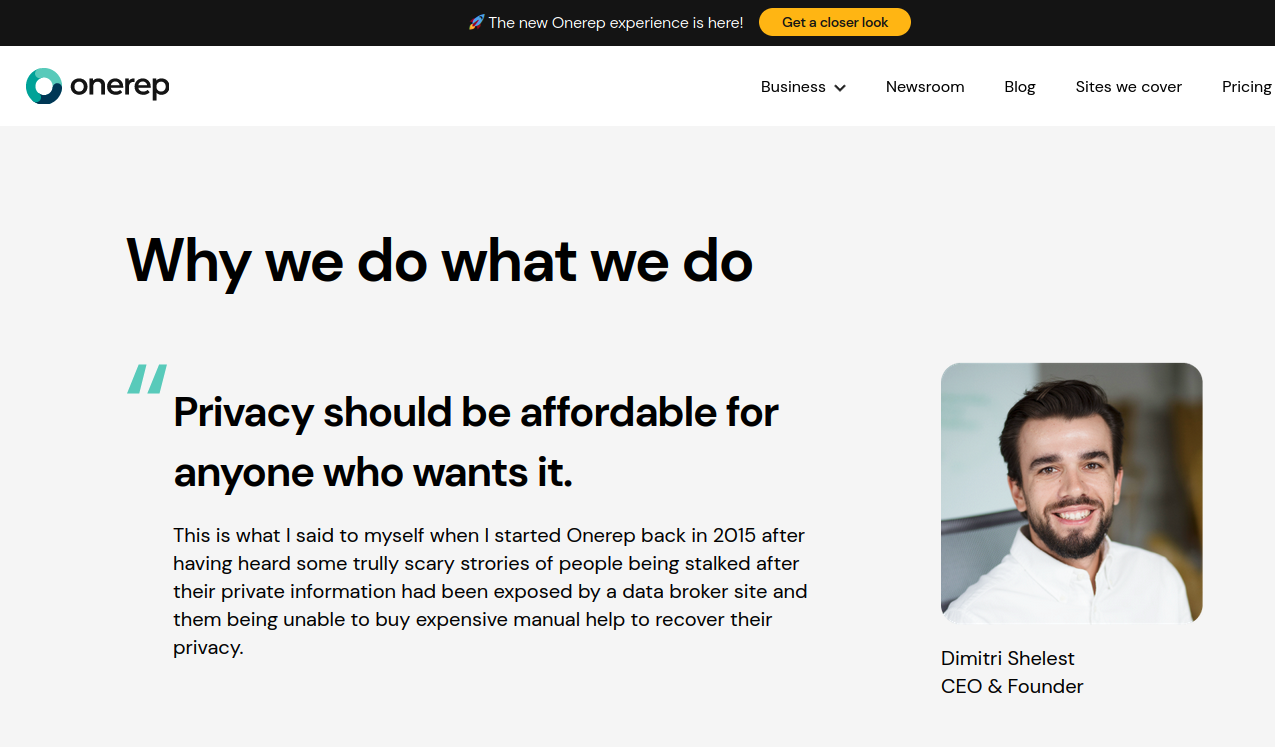
Onerep CEO and founder Dimitri Shelest.
In a statement released today, a spokesperson for Mozilla said it was moving away from Onerep as a service provider in its Monitor Plus product.
“Though customer data was never at risk, the outside financial interests and activities of Onerep’s CEO do not align with our values,” Mozilla wrote. “We’re working now to solidify a transition plan that will provide customers with a seamless experience and will continue to put their interests first.”
KrebsOnSecurity also reported that Shelest’s email address was used circa 2010 by an affiliate of Spamit, a Russian-language organization that paid people to aggressively promote websites hawking male enhancement drugs and generic pharmaceuticals. As noted in the March 14 story, this connection was confirmed by research from multiple graduate students at my alma mater George Mason University.
Shelest denied ever being associated with Spamit. “Between 2010 and 2014, we put up some web pages and optimize them — a widely used SEO practice — and then ran AdSense banners on them,” Shelest said, presumably referring to the dozens of people-search domains KrebsOnSecurity found were connected to his email addresses (dmitrcox@gmail.com and dmitrcox2@gmail.com). “As we progressed and learned more, we saw that a lot of the inquiries coming in were for people.”
Shelest also acknowledged that Onerep pays to run ads on “on a handful of data broker sites in very specific circumstances.”
“Our ad is served once someone has manually completed an opt-out form on their own,” Shelest wrote. “The goal is to let them know that if they were exposed on that site, there may be others, and bring awareness to there being a more automated opt-out option, such as Onerep.”
Reached via Twitter/X, HaveIBeenPwned founder Troy Hunt said he knew Mozilla was considering a partnership with Onerep, but that he was previously unaware of the Onerep CEO’s many conflicts of interest.
“I knew Mozilla had this in the works and we’d casually discussed it when talking about Firefox monitor,” Hunt told KrebsOnSecurity. “The point I made to them was the same as I’ve made to various companies wanting to put data broker removal ads on HIBP: removing your data from legally operating services has minimal impact, and you can’t remove it from the outright illegal ones who are doing the genuine damage.”
Playing both sides — creating and spreading the same digital disease that your medicine is designed to treat — may be highly unethical and wrong. But in the United States it’s not against the law. Nor is collecting and selling data on Americans. Privacy experts say the problem is that data brokers, people-search services like Nuwber and Onerep, and online reputation management firms exist because virtually all U.S. states exempt so-called “public” or “government” records from consumer privacy laws.
Those include voting registries, property filings, marriage certificates, motor vehicle records, criminal records, court documents, death records, professional licenses, and bankruptcy filings. Data brokers also can enrich consumer records with additional information, by adding social media data and known associates.
The March 14 story on Onerep was the second in a series of three investigative reports published here this month that examined the data broker and people-search industries, and highlighted the need for more congressional oversight — if not regulation — on consumer data protection and privacy.
On March 8, KrebsOnSecurity published A Close Up Look at the Consumer Data Broker Radaris, which showed that the co-founders of Radaris operate multiple Russian-language dating services and affiliate programs. It also appears many of their businesses have ties to a California marketing firm that works with a Russian state-run media conglomerate currently sanctioned by the U.S. government.
On March 20, KrebsOnSecurity published The Not-So-True People-Search Network from China, which revealed an elaborate web of phony people-search companies and executives designed to conceal the location of people-search affiliates in China who are earning money promoting U.S. based data brokers that sell personal information on Americans.
The data privacy company Onerep.com bills itself as a Virginia-based service for helping people remove their personal information from almost 200 people-search websites. However, an investigation into the history of onerep.com finds this company is operating out of Belarus and Cyprus, and that its founder has launched dozens of people-search services over the years.
Onerep’s “Protect” service starts at $8.33 per month for individuals and $15/mo for families, and promises to remove your personal information from nearly 200 people-search sites. Onerep also markets its service to companies seeking to offer their employees the ability to have their data continuously removed from people-search sites.

A testimonial on onerep.com.
Customer case studies published on onerep.com state that it struck a deal to offer the service to employees of Permanente Medicine, which represents the doctors within the health insurance giant Kaiser Permanente. Onerep also says it has made inroads among police departments in the United States.
But a review of Onerep’s domain registration records and that of its founder reveal a different side to this company. Onerep.com says its founder and CEO is Dimitri Shelest from Minsk, Belarus, as does Shelest’s profile on LinkedIn. Historic registration records indexed by DomainTools.com say Mr. Shelest was a registrant of onerep.com who used the email address dmitrcox2@gmail.com.
A search in the data breach tracking service Constella Intelligence for the name Dimitri Shelest brings up the email address dimitri.shelest@onerep.com. Constella also finds that Dimitri Shelest from Belarus used the email address d.sh@nuwber.com, and the Belarus phone number +375-292-702786.
Nuwber.com is a people search service whose employees all appear to be from Belarus, and it is one of dozens of people-search companies that Onerep claims to target with its data-removal service. Onerep.com’s website disavows any relationship to Nuwber.com, stating quite clearly, “Please note that OneRep is not associated with Nuwber.com.”
However, there is an abundance of evidence suggesting Mr. Shelest is in fact the founder of Nuwber. Constella found that Minsk telephone number (375-292-702786) has been used multiple times in connection with the email address dmitrcox@gmail.com. Recall that Onerep.com’s domain registration records in 2018 list the email address dmitrcox2@gmail.com.
It appears Mr. Shelest sought to reinvent his online identity in 2015 by adding a “2” to his email address. The Belarus phone number tied to Nuwber.com shows up in the domain records for comversus.com, and DomainTools says this domain is tied to both dmitrcox@gmail.com and dmitrcox2@gmail.com. Other domains that mention both email addresses in their WHOIS records include careon.me, docvsdoc.com, dotcomsvdot.com, namevname.com, okanyway.com and tapanyapp.com.

Onerep.com CEO and founder Dimitri Shelest, as pictured on the “about” page of onerep.com.
A search in DomainTools for the email address dmitrcox@gmail.com shows it is associated with the registration of at least 179 domain names, including dozens of mostly now-defunct people-search companies targeting citizens of Argentina, Brazil, Canada, Denmark, France, Germany, Hong Kong, Israel, Italy, Japan, Latvia and Mexico, among others.
Those include nuwber.fr, a site registered in 2016 which was identical to the homepage of Nuwber.com at the time. DomainTools shows the same email and Belarus phone number are in historic registration records for nuwber.at, nuwber.ch, and nuwber.dk (all domains linked here are to their cached copies at archive.org, where available).
Update, March 21, 11:15 a.m. ET: Mr. Shelest has provided a lengthy response to the findings in this story. In summary, Shelest acknowledged maintaining an ownership stake in Nuwber, but said there was “zero cross-over or information-sharing with OneRep.” Mr. Shelest said any other old domains that may be found and associated with his name are no longer being operated by him.
“I get it,” Shelest wrote. “My affiliation with a people search business may look odd from the outside. In truth, if I hadn’t taken that initial path with a deep dive into how people search sites work, Onerep wouldn’t have the best tech and team in the space. Still, I now appreciate that we did not make this more clear in the past and I’m aiming to do better in the future.” The full statement is available here (PDF).
Original story:
Historic WHOIS records for onerep.com show it was registered for many years to a resident of Sioux Falls, SD for a completely unrelated site. But around Sept. 2015 the domain switched from the registrar GoDaddy.com to eNom, and the registration records were hidden behind privacy protection services. DomainTools indicates around this time onerep.com started using domain name servers from DNS provider constellix.com. Likewise, Nuwber.com first appeared in late 2015, was also registered through eNom, and also started using constellix.com for DNS at nearly the same time.
Listed on LinkedIn as a former product manager at OneRep.com between 2015 and 2018 is Dimitri Bukuyazau, who says their hometown is Warsaw, Poland. While this LinkedIn profile (linkedin.com/in/dzmitrybukuyazau) does not mention Nuwber, a search on this name in Google turns up a 2017 blog post from privacyduck.com, which laid out a number of reasons to support a conclusion that OneRep and Nuwber.com were the same company.
“Any people search profiles containing your Personally Identifiable Information that were on Nuwber.com were also mirrored identically on OneRep.com, down to the relatives’ names and address histories,” Privacyduck.com wrote. The post continued:
“Both sites offered the same immediate opt-out process. Both sites had the same generic contact and support structure. They were – and remain – the same company (even PissedConsumer.com advocates this fact: https://nuwber.pissedconsumer.com/nuwber-and-onerep-20160707878520.html).”
“Things changed in early 2016 when OneRep.com began offering privacy removal services right alongside their own open displays of your personal information. At this point when you found yourself on Nuwber.com OR OneRep.com, you would be provided with the option of opting-out your data on their site for free – but also be highly encouraged to pay them to remove it from a slew of other sites (and part of that payment was removing you from their own site, Nuwber.com, as a benefit of their service).”
Reached via LinkedIn, Mr. Bukuyazau declined to answer questions, such as whether he ever worked at Nuwber.com. However, Constella Intelligence finds two interesting email addresses for employees at nuwber.com: d.bu@nuwber.com, and d.bu+figure-eight.com@nuwber.com, which was registered under the name “Dzmitry.”
PrivacyDuck’s claims about how onerep.com appeared and behaved in the early days are not readily verifiable because the domain onerep.com has been completely excluded from the Wayback Machine at archive.org. The Wayback Machine will honor such requests if they come directly from the owner of the domain in question.
Still, Mr. Shelest’s name, phone number and email also appear in the domain registration records for a truly dizzying number of country-specific people-search services, including pplcrwlr.in, pplcrwlr.fr, pplcrwlr.dk, pplcrwlr.jp, peeepl.br.com, peeepl.in, peeepl.it and peeepl.co.uk.
The same details appear in the WHOIS registration records for the now-defunct people-search sites waatpp.de, waatp1.fr, azersab.com, and ahavoila.com, a people-search service for French citizens.
A search on the email address dmitrcox@gmail.com suggests Mr. Shelest was previously involved in rather aggressive email marketing campaigns. In 2010, an anonymous source leaked to KrebsOnSecurity the financial and organizational records of Spamit, which at the time was easily the largest Russian-language pharmacy spam affiliate program in the world.
Spamit paid spammers a hefty commission every time someone bought male enhancement drugs from any of their spam-advertised websites. Mr. Shelest’s email address stood out because immediately after the Spamit database was leaked, KrebsOnSecurity searched all of the Spamit affiliate email addresses to determine if any of them corresponded to social media accounts at Facebook.com (at the time, Facebook allowed users to search profiles by email address).
That mapping, which was done mainly by generous graduate students at my alma mater George Mason University, revealed that dmitrcox@gmail.com was used by a Spamit affiliate, albeit not a very profitable one. That same Facebook profile for Mr. Shelest is still active, and it says he is married and living in Minsk [Update, Mar. 16: Mr. Shelest’s Facebook account is no longer active].
Scrolling down Mr. Shelest’s Facebook page to posts made more than ten years ago show him liking the Facebook profile pages for a large number of other people-search sites, including findita.com, findmedo.com, folkscan.com, huntize.com, ifindy.com, jupery.com, look2man.com, lookerun.com, manyp.com, peepull.com, perserch.com, persuer.com, pervent.com, piplenter.com, piplfind.com, piplscan.com, popopke.com, pplsorce.com, qimeo.com, scoutu2.com, search64.com, searchay.com, seekmi.com, selfabc.com, socsee.com, srching.com, toolooks.com, upearch.com, webmeek.com, and many country-code variations of viadin.ca (e.g. viadin.hk, viadin.com and viadin.de).
Domaintools.com finds that all of the domains mentioned in the last paragraph were registered to the email address dmitrcox@gmail.com.
Mr. Shelest has not responded to multiple requests for comment. KrebsOnSecurity also sought comment from onerep.com, which likewise has not responded to inquiries about its founder’s many apparent conflicts of interest. In any event, these practices would seem to contradict the goal Onerep has stated on its site: “We believe that no one should compromise personal online security and get a profit from it.”
Max Anderson is chief growth officer at 360 Privacy, a legitimate privacy company that works to keep its clients’ data off of more than 400 data broker and people-search sites. Anderson said it is concerning to see a direct link between between a data removal service and data broker websites.
“I would consider it unethical to run a company that sells people’s information, and then charge those same people to have their information removed,” Anderson said.
Last week, KrebsOnSecurity published an analysis of the people-search data broker giant Radaris, whose consumer profiles are deep enough to rival those of far more guarded data broker resources available to U.S. police departments and other law enforcement personnel.
That story revealed that the co-founders of Radaris are two native Russian brothers who operate multiple Russian-language dating services and affiliate programs. It also appears many of the Radaris founders’ businesses have ties to a California marketing firm that works with a Russian state-run media conglomerate currently sanctioned by the U.S. government.

KrebsOnSecurity will continue investigating the history of various consumer data brokers and people-search providers. If any readers have inside knowledge of this industry or key players within it, please consider reaching out to krebsonsecurity at gmail.com.
Update, March 15, 11:35 a.m. ET: Many readers have pointed out something that was somehow overlooked amid all this research: The Mozilla Foundation, the company that runs the Firefox Web browser, has launched a data removal service called Mozilla Monitor that bundles OneRep. That notice says Mozilla Monitor is offered as a free or paid subscription service.
“The free data breach notification service is a partnership with Have I Been Pwned (“HIBP”),” the Mozilla Foundation explains. “The automated data deletion service is a partnership with OneRep to remove personal information published on publicly available online directories and other aggregators of information about individuals (“Data Broker Sites”).”
In a statement shared with KrebsOnSecurity.com, Mozilla said they did assess OneRep’s data removal service to confirm it acts according to privacy principles advocated at Mozilla.
“We were aware of the past affiliations with the entities named in the article and were assured they had ended prior to our work together,” the statement reads. “We’re now looking into this further. We will always put the privacy and security of our customers first and will provide updates as needed.”

Did you just get word that your personal information may have been caught up in a data breach? If so, you can take steps to protect yourself from harm should your info get into the hands of a scammer or thief.
How does that information get collected in the first place? We share personal information with companies for multiple reasons simply by going about our day—to pay for takeout at our favorite restaurant, to check into a hotel, or to collect rewards at the local coffee shop. Of course, we use our credit and debit cards too, sometimes as part of an online account that tracks our purchase history.
In other words, we leave trails of data practically wherever we go these days, and that data is of high value to hackers. Thus, all those breaches we read about.
Whether it’s a major breach that exposes millions of records or one of many other smaller-scale breaches like the thousands that have struck healthcare providers, each one serves as a reminder that data breaches happen regularly and that we could find ourselves affected. Depending on the breach and the kind of information you’ve shared with the business or organization in question, information stolen in a breach could include:
What do crooks do with that data? Several things. Apart from using it themselves, they may sell that data to other criminals. Either way, this can lead to illicit use of credit and debit cards, draining of bank accounts, claiming tax refunds or medical expenses in the names of the victims, or, in extreme cases, assuming the identity of others altogether.
In all, data is a kind of currency in of itself because it has the potential to unlock several aspects of victim’s life, each with its own monetary value. It’s no wonder that big breaches like these have made the news over the years, with some of the notables including:
As mentioned, these are big breaches with big companies that we likely more than recognize. Yet smaller and mid-sized businesses are targets as well, with some 43% of data breaches involving companies of that size. Likewise, restaurants and retailers have seen their Point-of-Sale (POS) terminals compromised, right on down to neighborhood restaurants.
When a company experiences a data breach, customers need to realize that this could impact their online safety. If your favorite coffee shop’s customer database gets leaked, there’s a chance that your personal or financial information was exposed. However, this doesn’t mean that your online safety is doomed. If you think you were affected by a breach, you can take several steps to protect yourself from the potential side effects.
One of the most effective ways to determine whether someone is fraudulently using one or more of your accounts is to check your statements. If you see any charges that you did not make, report them to your bank or credit card company immediately. They have processes in place to handle fraud. While you’re with them, see if they offer alerts for strange purchases, transactions, or withdrawals.
Our credit monitoring service can help you keep an eye on this. It monitors changes to your credit score, report, and accounts with timely notifications and guidance so you can take action to tackle identity theft.
Breached and stolen information often ends up in dark web marketplaces where hackers, scammers, and thieves purchase it to commit yet more crime. Once it was difficult to know if your information was caught up in such marketplaces, yet now an identity monitoring service can do the detective work for you.
Our service monitors the dark web for your personal info, including email, government IDs, credit card and bank account info, and more. This can help keep your personal info safe with early alerts that show you if your data is found on the dark web, an average of 10 months ahead of similar services. From there, you’ll get guidance that you can act on, which can help protect your info and accounts from theft.
If you suspect that your data might have been compromised, place a fraud alert on your credit. This not only ensures that any new or recent requests undergo scrutiny, but also allows you to have extra copies of your credit report so you can check for suspicious activity. You can place one fraud alert with any of the three major credit reporting agencies (Equifax, Experian, TransUnion) and they will notify the other two. A fraud alert typically lasts for a year, although there are options for extending it as well.
Freezing your credit will make it highly difficult for criminals to take out loans or open new accounts in your name, as a freeze halts all requests to pull your credit—even legitimate ones. In this way, it’s a far stronger measure than placing a fraud alert. Note that if you plan to take out a loan, open a new credit card, or other activity that will prompt a credit report, you’ll need to take extra steps to see that through while the freeze is in place. (The organization you’re working with can assist with the specifics.) Unlike the fraud alert, you’ll need to contact each major credit reporting agency to put one in place. Also, a freeze lasts as long as you have it in place. You’ll have to remove it yourself, again with each agency.
You can centrally manage this process with our security freeze service, which stops companies from looking at your credit profile, and thus halts the application process for loans, credit cards, utilities, new bank accounts, and more. A security freeze won’t affect your credit score.
Ensure that your passwords are strong and unique. Many people utilize the same password or variations of it across all their accounts. Therefore, be sure to diversify your passcodes to ensure hackers cannot obtain access to all your accounts at once, should one password be compromised. You can also employ a password manager to keep track of your credentials, such as the one you’ll find in comprehensive online protection software.
If the unfortunate happens to you, an identity theft coverage & restoration service can help you get back on your feet. Ours offers $1 million in coverage for lawyer fees, travel expenses, and stolen funds reimbursement. It further provides support from a licensed recovery expert who can take the needed steps to repair your identity and credit. In all, it helps you recover the costs of identity theft along with the time and money it takes to recover from it.
You can take this step any time, even if you haven’t been caught up in a data breach. The fact is that data broker companies collect and sell thousands of pieces of information on millions and millions of people worldwide, part of a global economy estimated at $200 billion U.S. dollars a year. And they’ll sell it to anyone—from advertisers for their campaigns, to scammers who will use it for spammy emails, texts, and calls, and to thieves who use that information for identity theft.
Yet you can clean it up. Our personal data cleanup service can scan some of the riskiest data broker sites and show you which ones are selling your personal info. It also provides guidance on how you can remove your data from those sites and, with select products, even manage the removal for you.
Comprehensive online protection software will offer you the tools and services listed above, along with further features that can protect you online. That includes a VPN to keep your time online more private from online data collection while protecting it from thieves who’re out to steal credit card and account information. It also includes web browsing protection that can warn you of sketchy websites and malicious downloads that look to steal your information. In all, it’s thorough protection for your devices, privacy, and identity. And in a time of data breaches, that kind of protection has become essential.
The post How to Protect Yourself From Identity Theft After a Data Breach appeared first on McAfee Blog.
Malicious hackers are targeting people in the cryptocurrency space in attacks that start with a link added to the target’s calendar at Calendly, a popular application for scheduling appointments and meetings. The attackers impersonate established cryptocurrency investors and ask to schedule a video conference call. But clicking the meeting link provided by the scammers prompts the user to run a script that quietly installs malware on macOS systems.
KrebsOnSecurity recently heard from a reader who works at a startup that is seeking investment for building a new blockchain platform for the Web. The reader spoke on condition that their name not be used in this story, so for the sake of simplicity we’ll call him Doug.
Being in the cryptocurrency scene, Doug is also active on the instant messenger platform Telegram. Earlier this month, Doug was approached by someone on Telegram whose profile name, image and description said they were Ian Lee, from Signum Capital, a well-established investment firm based in Singapore. The profile also linked to Mr. Lee’s Twitter/X account, which features the same profile image.
The investor expressed interest in financially supporting Doug’s startup, and asked if Doug could find time for a video call to discuss investment prospects. Sure, Doug said, here’s my Calendly profile, book a time and we’ll do it then.

When the day and time of the scheduled meeting with Mr. Lee arrived, Doug clicked the meeting link in his calendar but nothing happened. Doug then messaged the Mr. Lee account on Telegram, who said there was some kind of technology issue with the video platform, and that their IT people suggested using a different meeting link.
Doug clicked the new link, but instead of opening up a videoconference app, a message appeared on his Mac saying the video service was experiencing technical difficulties.
“Some of our users are facing issues with our service,” the message read. “We are actively working on fixing these problems. Please refer to this script as a temporary solution.”
Doug said he ran the script, but nothing appeared to happen after that, and the videoconference application still wouldn’t start. Mr. Lee apologized for the inconvenience and said they would have to reschedule their meeting, but he never responded to any of Doug’s follow-up messages.
It didn’t dawn on Doug until days later that the missed meeting with Mr. Lee might have been a malware attack. Going back to his Telegram client to revisit the conversation, Doug discovered his potential investor had deleted the meeting link and other bits of conversation from their shared chat history.
In a post to its Twitter/X account last month, Signum Capital warned that a fake profile pretending to be their employee Mr. Lee was trying to scam people on Telegram.

The file that Doug ran is a simple Apple Script (file extension “.scpt”) that downloads and executes a malicious trojan made to run on macOS systems. Unfortunately for us, Doug freaked out after deciding he’d been tricked — backing up his important documents, changing his passwords, and then reinstalling macOS on his computer. While this a perfectly sane response, it means we don’t have the actual malware that was pushed to his Mac by the script.
But Doug does still have a copy of the malicious script that was downloaded from clicking the meeting link (the online host serving that link is now offline). A search in Google for a string of text from that script turns up a December 2023 blog post from cryptocurrency security firm SlowMist about phishing attacks on Telegram from North Korean state-sponsored hackers.
“When the project team clicks the link, they encounter a region access restriction,” SlowMist wrote. “At this point, the North Korean hackers coax the team into downloading and running a ‘location-modifying’ malicious script. Once the project team complies, their computer comes under the control of the hackers, leading to the theft of funds.”
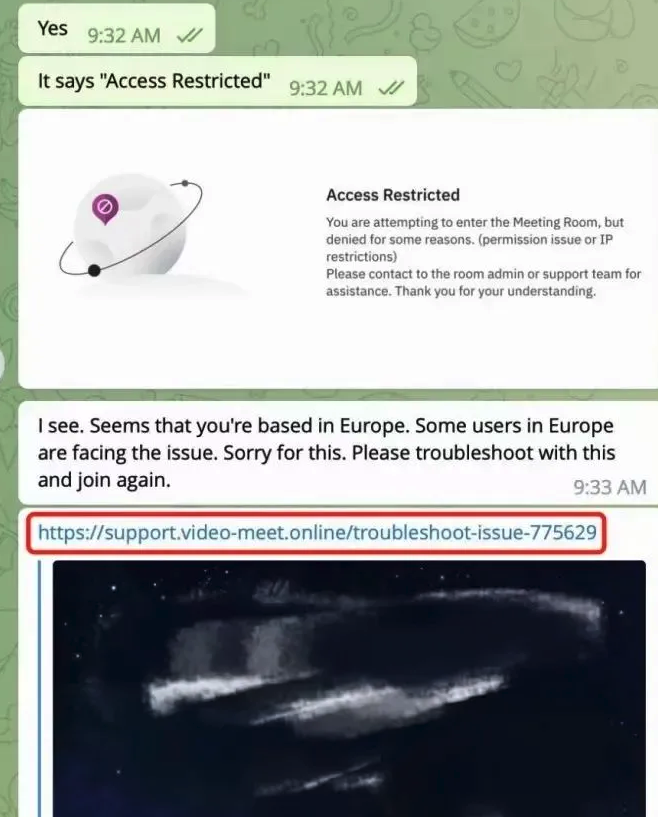
Image: SlowMist.
SlowMist says the North Korean phishing scams used the “Add Custom Link” feature of the Calendly meeting scheduling system on event pages to insert malicious links and initiate phishing attacks.
“Since Calendly integrates well with the daily work routines of most project teams, these malicious links do not easily raise suspicion,” the blog post explains. “Consequently, the project teams may inadvertently click on these malicious links, download, and execute malicious code.”
SlowMist said the malware downloaded by the malicious link in their case comes from a North Korean hacking group dubbed “BlueNoroff, which Kaspersky Labs says is a subgroup of the Lazarus hacking group.
“A financially motivated threat actor closely connected with Lazarus that targets banks, casinos, fin-tech companies, POST software and cryptocurrency businesses, and ATMs,” Kaspersky wrote of BlueNoroff in Dec. 2023.
The North Korean regime is known to use stolen cryptocurrencies to fund its military and other state projects. A recent report from Recorded Future finds the Lazarus Group has stolen approximately $3 billion in cryptocurrency over the past six years.
While there is still far more malware out there today targeting Microsoft Windows PCs, the prevalence of information-stealing trojans aimed at macOS users is growing at a steady clip. MacOS computers include X-Protect, Apple’s built-in antivirus technology. But experts say attackers are constantly changing the appearance and behavior of their malware to evade X-Protect.
“Recent updates to macOS’s XProtect signature database indicate that Apple are aware of the problem, but early 2024 has already seen a number of stealer families evade known signatures,” security firm SentinelOne wrote in January.
According to Chris Ueland from the threat hunting platform Hunt.io, the Internet address of the fake meeting website Doug was tricked into visiting (104.168.163,149) hosts or very recently hosted about 75 different domain names, many of which invoke words associated with videoconferencing or cryptocurrency. Those domains indicate this North Korean hacking group is hiding behind a number of phony crypto firms, like the six-month-old website for Cryptowave Capital (cryptowave[.]capital).

In a statement shared with KrebsOnSecurity, Calendly said it was aware of these types of social engineering attacks by cryptocurrency hackers.
“To help prevent these kinds of attacks, our security team and partners have implemented a service to automatically detect fraud and impersonations that could lead to social engineering,” the company said. “We are also actively scanning content for all our customers to catch these types of malicious links and to prevent hackers earlier on. Additionally, we intend to add an interstitial page warning users before they’re redirected away from Calendly to other websites. Along with the steps we’ve taken, we recommend users stay vigilant by keeping their software secure with running the latest updates and verifying suspicious links through tools like VirusTotal to alert them of possible malware. We are continuously strengthening the cybersecurity of our platform to protect our customers.”
The increasing frequency of new Mac malware is a good reminder that Mac users should not depend on security software and tools to flag malicious files, which are frequently bundled with or disguised as legitimate software.
As KrebsOnSecurity has advised Windows users for years, a good rule of safety to live by is this: If you didn’t go looking for it, don’t install it. Following this mantra heads off a great deal of malware attacks, regardless of the platform used. When you do decide to install a piece of software, make sure you are downloading it from the original source, and then keep it updated with any new security fixes.
On that last front, I’ve found it’s a good idea not to wait until the last minute to configure my system before joining a scheduled videoconference call. Even if the call uses software that is already on my computer, it is often the case that software updates are required before the program can be used, and I’m one of those weird people who likes to review any changes to the software maker’s privacy policies or user agreements before choosing to install updates.
Most of all, verify new contacts from strangers before accepting anything from them. In this case, had Doug simply messaged Mr. Lee’s real account on Twitter/X or contacted Signum Capital directly, he would discovered that the real Mr. Lee never asked for a meeting.
If you’re approached in a similar scheme, the response from the would-be victim documented in the SlowMist blog post is probably the best.

Image: SlowMist.
Update: Added comment from Calendly.
New bug bounty(vulnerabilities) collector
# python3 main.py
*2024-02-20 16:14:47.836189*
1. Arbitrary File Reading due to Lack of Input Filepath Validation
- Feb 6th 2024 / High (CVE-2024-0964)
- gradio-app/gradio
- https://huntr.com/bounties/25e25501-5918-429c-8541-88832dfd3741/
2. View Barcode Image leads to Remote Code Execution
- Jan 31st 2024 / Critical (CVE: Not yet)
- dolibarr/dolibarr
- https://huntr.com/bounties/f0ffd01e-8054-4e43-96f7-a0d2e652ac7e/
(delimiter-based file database)
# vim feeds.db
1|2024-02-20 16:17:40.393240|7fe14fd58ca2582d66539b2fe178eeaed3524342|CVE-2024-0964|https://huntr.com/bounties/25e25501-5918-429c-8541-88832dfd3741/
2|2024-02-20 16:17:40.393987|c6b84ac808e7f229a4c8f9fbd073b4c0727e07e1|CVE: Not yet|https://huntr.com/bounties/f0ffd01e-8054-4e43-96f7-a0d2e652ac7e/
3|2024-02-20 16:17:40.394582|7fead9658843919219a3b30b8249700d968d0cc9|CVE: Not yet|https://huntr.com/bounties/d6cb06dc-5d10-4197-8f89-847c3203d953/
4|2024-02-20 16:17:40.395094|81fecdd74318ce7da9bc29e81198e62f3225bd44|CVE: Not yet|https://huntr.com/bounties/d875d1a2-7205-4b2b-93cf-439fa4c4f961/
5|2024-02-20 16:17:40.395613|111045c8f1a7926174243db403614d4a58dc72ed|CVE: Not yet|https://huntr.com/bounties/10e423cd-7051-43fd-b736-4e18650d0172/
To know more about our Attack Surface Management platform, check out NVADR.
Demonized Shell is an Advanced Tool for persistence in linux.
git clone https://github.com/MatheuZSecurity/D3m0n1z3dShell.git
cd D3m0n1z3dShell
chmod +x demonizedshell.sh
sudo ./demonizedshell.sh
Download D3m0n1z3dShell with all files:
curl -L https://github.com/MatheuZSecurity/D3m0n1z3dShell/archive/main.tar.gz | tar xz && cd D3m0n1z3dShell-main && sudo ./demonizedshell.sh
Load D3m0n1z3dShell statically (without the static-binaries directory):
sudo curl -s https://raw.githubusercontent.com/MatheuZSecurity/D3m0n1z3dShell/main/static/demonizedshell_static.sh -o /tmp/demonizedshell_static.sh && sudo bash /tmp/demonizedshell_static.sh
And other types of features that will come in the future.
If you want to contribute and help with the tool, please contact me on twitter: @MatheuzSecurity
We are not responsible for any damage caused by this tool, use the tool intelligently and for educational purposes only.
DOUGLAS-042 stands as an ingenious embodiment of a PowerShell script meticulously designed to expedite the triage process and facilitate the meticulous collection of crucial evidence derived from both forensic artifacts and the ephemeral landscape of volatile data. Its fundamental mission revolves around providing indispensable aid in the arduous task of pinpointing potential security breaches within Windows ecosystems. With an overarching focus on expediency, DOUGLAS-042 orchestrates the efficient prioritization and methodical aggregation of data, ensuring that no vital piece of information eludes scrutiny when investigating a possible compromise. As a testament to its organized approach, the amalgamated data finds its sanctuary within the confines of a meticulously named text file, bearing the nomenclature of the host system's very own hostname. This practice of meticulous data archival emerges not just as a systematic convention, but as a cornerstone that paves the way for seamless transitions into subsequent stages of the Forensic journey.
Using administrative privileges, just run the script from a PowerShell console, then the results will be saved in the directory as a txt file.
$ PS >./douglas.ps1
$ PS >./douglas.ps1 -a
Associated-Threat-Analyzer detects malicious IPv4 addresses and domain names associated with your web application using local malicious domain and IPv4 lists.
git clone https://github.com/OsmanKandemir/associated-threat-analyzer.git
cd associated-threat-analyzer && pip3 install -r requirements.txt
python3 analyzer.py -d target-web.com
You can run this application on a container after build a Dockerfile.
docker build -t osmankandemir/threatanalyzer .
docker run osmankandemir/threatanalyzer -d target-web.com
docker pull osmankandemir/threatanalyzer
docker run osmankandemir/threatanalyzer -d target-web.com
-d DOMAIN , --domain DOMAIN Input Target. --domain target-web1.com
-t DOMAINSFILE, --DomainsFile Malicious Domains List to Compare. -t SampleMaliciousDomains.txt
-i IPSFILE, --IPsFile Malicious IPs List to Compare. -i SampleMaliciousIPs.txt
-o JSON, --json JSON JSON output. --json
https://github.com/OsmanKandemir/indicator-intelligence
https://github.com/stamparm/blackbook
https://github.com/stamparm/ipsum
Welcome to the AD Pentesting Toolkit! This repository contains a collection of PowerShell scripts and commands that can be used for Active Directory (AD) penetration testing and security assessment. The scripts cover various aspects of AD enumeration, user and group management, computer enumeration, network and security analysis, and more.
The toolkit is intended for use by penetration testers, red teamers, and security professionals who want to test and assess the security of Active Directory environments. Please ensure that you have proper authorization and permission before using these scripts in any production environment.
Everyone is looking at what you are looking at; But can everyone see what he can see? You are the only difference between them… By Mevlânâ Celâleddîn-i Rûmî
The AD Pentesting Toolkit is for educational and testing purposes only. The authors and contributors are not responsible for any misuse or damage caused by the use of these scripts. Always ensure that you have proper authorization and permission before performing any penetration testing or security assessment activities on any system or network.
This project is licensed under the MIT License. The Mewtwo ASCII art is the property of Alperen Ugurlu. All rights reserved.
Raw html extractor from Hurricane Electric portal
go install -v github.com/HuntDownProject/hednsextractor/cmd/hednsextractor@latest
usage -hGetting the IP Addresses used for hackerone.com, and enumerating only the networks.
nslookup hackerone.com | awk '/Address: / {print $2}' | hednsextractor -silent -only-networks
[INF] [104.16.99.52] 104.16.0.0/12
[INF] [104.16.99.52] 104.16.96.0/20Getting the IP Addresses used for hackerone.com, and enumerating only the domains (using tail to show the first 10 results).
nslookup hackerone.com | awk '/Address: / {print $2}' | hednsextractor -silent -only-domains | tail -n 10
herllus.com
hezzy.store
hilariostore.com
hiperdrop.com
hippratas.online
hitsstory.com
hobbyshop.site
holyangelstore.com
holzfallerstore.fun
homedescontoo.comEdit the config file and add the Virustotal API Key
cat $HOME/.config/hednsextractor/config.yaml # hednsextractor config file
# generated by https://github.com/projectdiscovery/goflags
# show only domains
#only-domains: false
# show only networks
#only-networks: false
# show virustotal score
#vt: false
# minimum virustotal score to show
#vt-score: 0
# ip address or network to query
#target:
# show silent output
#silent: false
# show verbose output
#verbose: false
# virustotal api key
vt-api-key: Your API Key goes hereSo, run the hednsextractor with -vt parameter.
nslookup hackerone.com | awk '/Address: / {print $2}' | hednsextractor -only-domains -vt And the output will be as below
_______ ______ _ _______ _______ _________ _______ _______ _______ _________ _______ _______
|\ /|( ____ \( __ \ ( ( /|( ____ \( ____ \|\ /|\__ __/( ____ )( ___ )( ____ \\__ __/( ___ )( ____ )
| ) ( || ( \/| ( \ )| \ ( || ( \/| ( \/( \ / ) ) ( | ( )|| ( ) || ( \/ ) ( | ( ) || ( )|
| (___) || (__ | | ) || \ | || (_____ | (__ \ (_) / | | | (____)|| (___) || | | | | | | || (____)|
| ___ || __) | | | || (\ \) |(_____ )| __) ) _ ( | | | __)| ___ || | | | | | | || __)
| ( ) || ( | | ) || | \ | ) || ( / ( ) \ | | | (\ ( | ( ) || | | | | | | || (\ (
| ) ( || (____/\| (__/ )| ) \ |/\____) || (____/\( / \ ) | | | ) \ \__| ) ( || (____/\ | | | (___) || ) \ \__
|/ \|(_______/(______/ |/ )_)\_______)(_______/|/ \| )_( |/ \__/|/ \|(_______/ )_( (_______)|/ \__/
[INF] Current hednsextractor version v1.0.0
[INF] [104.16.0.0/12] domain: ohst.ltd VT Score: 0
[INF] [104.16.0.0/12] domain: jxcraft.net VT Score: 0
[INF] [104.16.0.0/12] domain: teatimegm.com VT Score: 2
[INF] [104.16.0.0/12] domain: debugcheat.com VT Score: 0
Introducing SOC Multi-tool, a free and open-source browser extension that makes investigations faster and more efficient. Now available on the Chrome Web Store and compatible with all Chromium-based browsers such as Microsoft Edge, Chrome, Brave, and Opera.
Now available on Chrome Web Store!
SOC Multi-tool eliminates the need for constant copying and pasting during investigations. Simply highlight the text you want to investigate, right-click, and navigate to the type of data highlighted. The extension will then open new tabs with the results of your investigation.
The SOC Multi-tool is a modernized multi-tool built from the ground up, with a range of features and capabilities. Some of the key features include:
You can easily install the extension by downloading the release from the Chrome Web Store!
If you wish to make edits you can download from the releases page, extract the folder and make your changes.
To load your edited extension turn on developer mode in your browser's extensions settings, click "Load unpacked" and select the extracted folder!
SOC Multi-tool is a community-driven project and the developer encourages users to contribute and share better resources.
C2-Hunter is a program designed for malware analysts to extract Command and Control (C2) traffic from malwares in real-time. The program uses a unique approach by hooking into win32 connections APIs.
With C2-Hunter, malware analysts can now intercept and analyze communication in real-time, gaining valuable insights into the inner workings of cyber threats. Its ability to track C2 elements of malware makes it an essential tool for any cyber security team.


